











[Te award] represents the recognition of how wonderful and unexpected discoveries come from a curiosity in basic science fnanced by taxpayer money. It’s probably the most important message, that this investment really pays of.
Victor
Ambros '24 Nobel Prize Winner in Medicine or Physiology
[Acemoglu] is the sort of economist who shifts the way you see the world. He is an extraordinary example of the transformative work that is generated by MIT's Department of Economics.
Agustin Rayo Dean of MIT’s Humanities, Arts and Social Sciences School
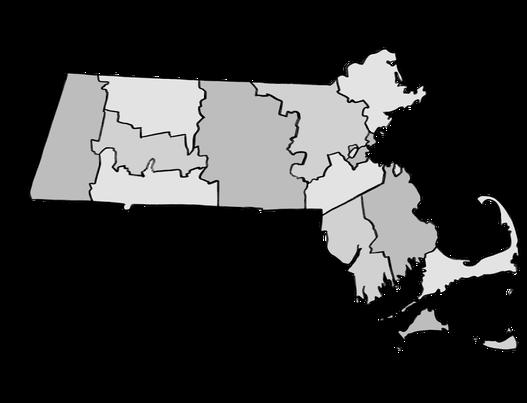
By Hana Futai & Ellie Shim
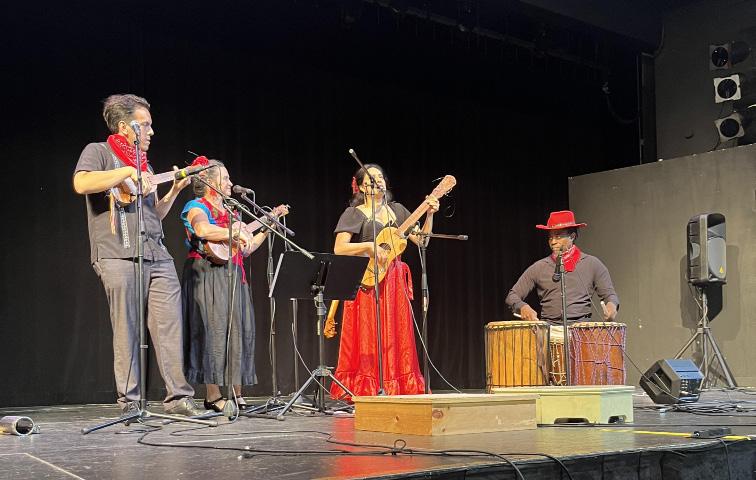
On Oct. 1, the Spanish Service Club hosted South’s annual Hispanic Heritage Day. Troughout the school day, guest speakers from Nicaragua and a Son Jarocho band performed to celebrate Hispanic heritage and culture. South students also attended a student and staf panel discussion, musical performance and movie screening.
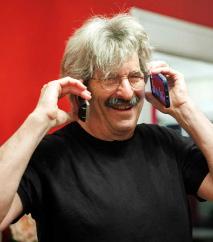
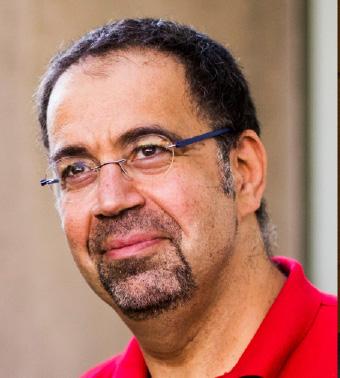
On Oct. 7, Newton resident Gary Ruvkun was awarded the 2024 Nobel Prize in Physiology or Medicine for his discovery of microRNA and its role in post-transcriptional regulation. MicroRNA molecules are small bits of genetic material that regulate which genes get translated into proteins and which genes get suppressed. Ruvken and his fellow partner Victor Ambros will receive their awards at prize ceremonies on Dec. 10.
On Oct. 15, Newton resident Daron Acemoglu was awarded the 2024 Nobel Prize in Economics Sciences. Acemoglu was awarded alongside two partners, Simon Johnson and James A. Robinson, who studied the causes of varying wealth between nations. Te economists researched political and economic systems created by European colonizers and generated tools that can explain the diferences and changes in institutions.

In early October,
experiences: the ‘Harvest Awakening,’ the ‘Rise of Annkh’, ‘Into the Astray’ and ‘Te Graveyard’. Te experiences include professionally trained scare actors and countless unexpected frights. Te festival is scheduled to run until Nov. 3.
I hope that students from Latino and Hispanic heritage at South felt supported and recognized.
Tis was special because we had representation from all diferent places and they all have such diferent ways of how they see Hispanic culture. Tis panel allowed people see this diversity in our culture.
Leanor González de las Casas Panelist, class of '27
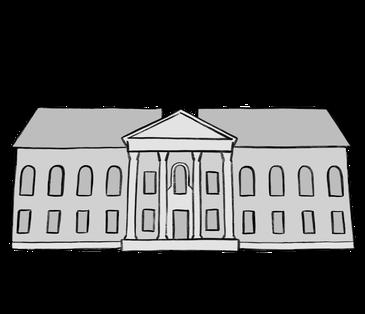
I hope to ofer an escape from regular day life so that people can be a kid again. It’s going to be a wicked awesome time.
It’s exciting to see Boston expanding on their Halloween festivities not only for young ages, but for all. I am looking forward to seeing what this festival has to ofer.
Following victories in their Democratic primaries, Greg Schwartz becomes 12th Middlesex's State Representative, while Amy Sangiolo faces off against Republican Vlad Yanovsky in 11th Middlesex
By Hana Futai, Erik Sternlof & Sanjana Tewari
On Sept. 3, Newton residents voted in the Democratic primaries and nominated Amy Sangiolo and Greg Schwartz as the Democratic candidates for the 11th and 12th Middlesex State Representative seats.
Sangiolo ran against Alex Jablon and won with 83 percent of the vote. Schwartz ran against City Councilors Bill Humphrey and Rick Lipof; he won with 40 percent of the vote.
With the general election on Nov. 3, Sangiolo continues her campaign, now against Republican Vlad Yanovsky.
With no challenger, Schwartz will go directly to the 12th Middlesex seat, representing south Newton and parts of Brookline.
Sangiolo previously served on Newton City Council for 20 years before leaving to run for mayor in 2021. Currently, she is a consumer advocate for the Attorney General’s ofce and a co-founder of Fig City News.
Sangiolo said that her credentials and community outreach have helped people in Newton to get to know her and her name.
“What motivated my candidacy was my long-standing career in advocacy and my desire to continue to help the residents of Newton,” she said.“It was a perfect opportunity to use the skills that I have gained over my entire career advocating for people.”
Schwartz was a City Councilor for eight years and has been a primary care physician for the past 20 years.
While also trained as a lawyer, Schwartz said that his medical experience will bring a missing perspective to the Statehouse.
“I will be the only doctor in the state house of 200 legislators. While that's not the only perspective needed, it's an important one,” he said. “I can bring that perspective on a more regular basis to the conversations and deliberations.”
A current senior at Haverford College, Jack Norton served as feld director for both Sangiolo and Schwartz’ primary campaigns. He said that Schwartz’ race was much more competitive.
“With Amy, we kind of knew we were going to win, but for Greg, I really didn't have any idea, so that made it much more exciting, but also much more nerve wracking,” he said.
Sangiolo’s Republican opponent, Vlad Yanovsky, immigrated from Russia and joined the military to then become a paramedic. Later, he opened a nonproft organization focusing on the education of inner-city women.
Despite the success of Republicans like Charlie Baker and Mitt Romney, Norton said
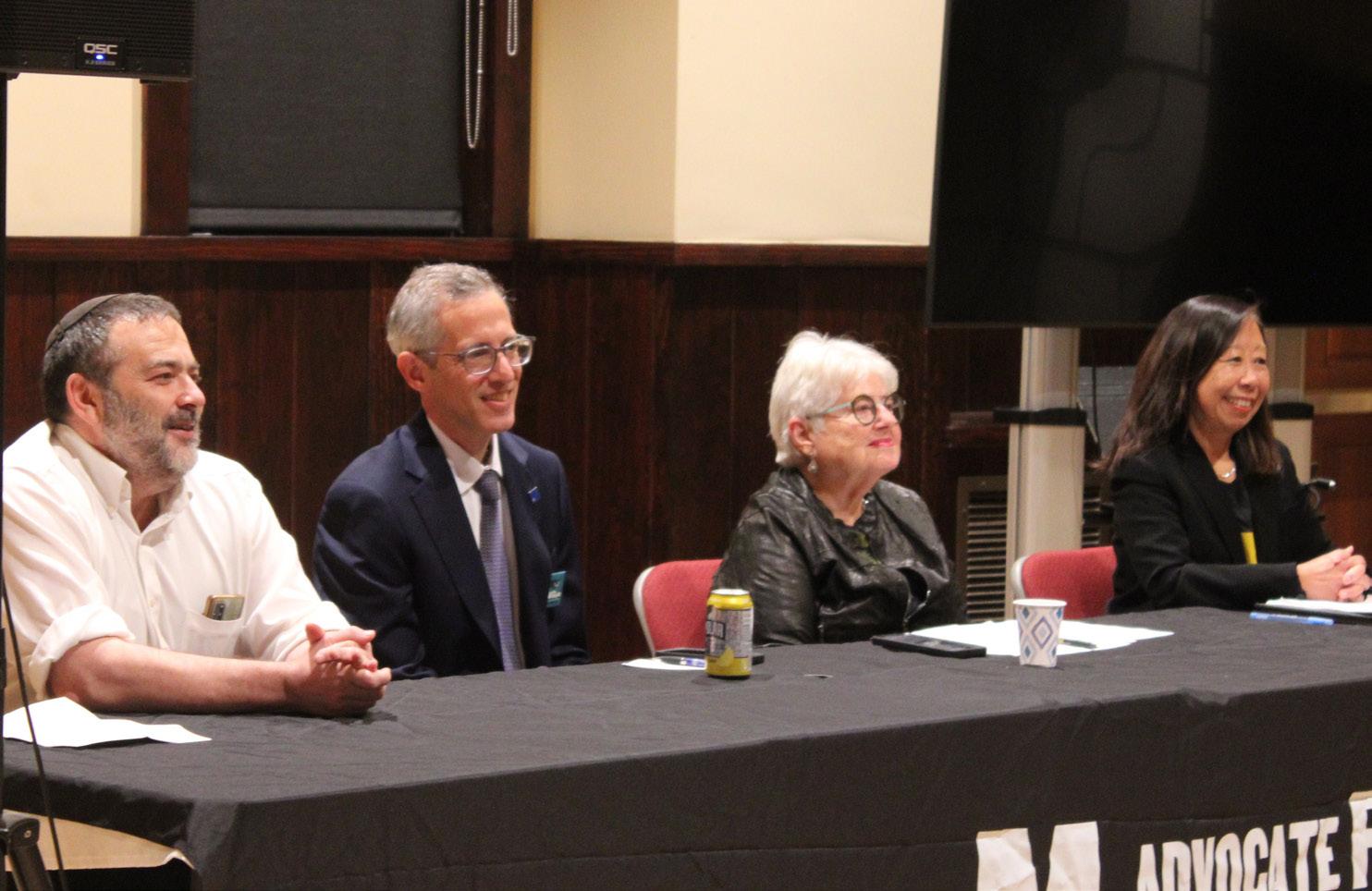
that Yanovsky’s stances will not earn him much local support.
“Massachusetts is fairly wealthy and fscally moderate, and it’s shown that it's willing to vote for pragmatic Republicans, but it’s also one the most culturally liberal states, so you can't come of as some kind of super religious right wing nut job,” he said. “He's aligning himself with Donald Trump, which won't help him.”
Yanovsky said that his policies are a refection of his own code of morals, rather than a particular party platform.
“I’m not a member of any party, per se,
Reaching out to undecided voters is difcult but important, because when voting in local elections, you have a lot more sway than in a national election
Forest Lanciloti class of '26 Sangiolo Campaign Volunteer
but the Republican Party is more closely aligned with who and what I am,” he said. “My policies would revert back to personal responsibility. I'm going to show to the people what actually goes on behind closed doors, and make people believe that they can do something,” Yanovsky said.
In his role as feld director, Norton man-
aged the campaigns’ voter outreach and data, including phone banking and door knocking. He said the nature of the primary created unique challenges in voter persuasion.
“With a Democrat-only election, 90 percent of problems we agree on, and so the last 10 percent, the solutions, is where the disagreements are,” he said. “For most, politics is not their life, so they might not know what they want policy-wise. If the voters don't even know exactly what they want, it’s really hard to tailor your message to convince them.”
Junior Forest Lanciloti, a volunteer for Sangiolo’s campaign, said that Sangiolo’s support helps convince undecided voters he talks to when door-knocking.
“Reaching out to undecided voters is difcult but important, because when voting in local elections, you have a lot more sway than in a national election,” he said.
“Amy has a ton of endorsements from a wide variety of people like the governor and senators. She is a great person, and a lot of people recognize that.”
Norton said that campaigns would not function without volunteers like Lanciloti.
“Campaign work is a lot of theoretical work, but you actually need people to do it, to knock on the doors and persuade the voters. High schoolers were doing a lot of that stuf, which was really invaluable,” he said.
Ward Two At-Large City Councilor Tarik Lucas volunteered for both Sangiolo and Schwartz’ campaigns, holding signs, canvassing doors, and making calls. Lucas said his colleagues are a large part of what made working on the campaigns enjoyable.
“It was fun working on the campaign, because we had a good campaign team, including a South student and alumni of North and South. Also, I got to interact and meet well with new people,” he said.
Involved in Newton politics since his mom ran for City Council when he was fve years old, Norton said that students can reap many benefts from getting involved.
“Out of self interest, it's great for your resume. Political work is an indication that you have believed in something, that you backed up your belief with actual action, and that you are able to efectively communicate,” he said. “It's also a lot of fun. Like sports, you're on a team, you do your job, and then at the end, if everyone does their job right, you win.”
Looking forward, Lucas said that he hopes to see Sangiolo continue to run a strong campaign and Schwartz deliver on his promises.
Political work is an indication that you have believed in something, and that you backed up your belief with actual action...
It's also a lot of fun
Jack Norton Field Director Schwartz Campaign
“My message to Amy would be, ‘don't assume you're going to win. Finish strong, continue to go to community events, continue to raise money, keep doing what you're doing’,” he said. “And for Greg, I just want to see him advocate for us, you and me, when it comes to health care.”
Schwartz said he is currently focusing on connecting with members of the community.
“I want to represent everybody, no matter who they supported before,” he said.“I'm excited to bridge the gap that many people feel between what they're experiencing in their daily lives and what the state can do about it,” he said.
Norton said that, ultimately, winning was the best part of the campaign.
“When it came in that we won, the frst feeling was, ‘Wow, everything I did paid of,’” he said.“But more than that, it's always great to see good people we care about succeed.”
Kaylee Germain & Alex Zakuta
News Contributor & News Editor
On Sept. 15 and Sept. 29, respectively, the Newton Upper Falls and Newtonville Village Days took place.
Tese annual events are organized by the Newton Upper Falls Area Council and the Newtonville Area Council, and ofer free admission to all attendees.
Local businesses, artists and vendors gathered at Pettee Square in Upper Falls and Walnut Street in Newtonville alongside residents from all across Newton.
Troughout both days, villages hosted musical performances, crafts, games and attractions for all ages, among tented booths highlighting local businesses.
North Cambridge Family Opera member Amy Ursch, who ran a booth at Newtonville
Village Days allow us to actually see many of the businesses that make Newton special. You see everything from restaurants to you studios to art.
Dr. Laura DeVeau
Newtonville Area Council Member
Village Day, said that COVID inficted signifcant damage to numerous establishments, and that some are still feeling the efects of the pandemic.
“We’re still really trying to rebuild after the pandemic,” she said. “We used to have a regular 130 to 150 participants each year, but after the pandemic that [number] knocked down a lot.”
Ursch said that the Newton Village Days are instrumental in providing businesses with support and ofering them a platform to expand their infuence.
“I get to meet a lot of cool people and tell them about something I really enjoy, and has been a really important part of my life,” she said. ”It ofers people a chance to try out something that they think they might not be good at, but learn how to get better at.”
Several newly established stores set up their booths along the streets at the fair. OTTO, a recently opened pizza restaurant on Walnut Street, participated in the fair to attract more customers.
OTTO marketing director Eric Shepard said that Village Day enables people to get acquainted with local businesses before buying something, while also allowing businesses to cultivate a consumer base.
“It's really great to engage with the community and get to know people and we've made some really great connections today,” he said. “We'll be back every year for sure.”
Karla Vega, the manager of online clothing company Inspiher Empire, said that she appreciates the opportunity to engage with the Newton community and introduce people to

her brand in a way that she wouldn’t be able to otherwise.
“I don't have a brick and mortar, so I actually like to talk to people. People like to know the girl behind the brand, and it's nice to be part of the community and give back,” she said.
Josephine McNeil, Executive Director of CAN-DO, a nonproft organization that develops afordable housing and provides services to low income people, said that Newton Village Days can also serve as a space to encourage political activism.
“It's an opportunity to see a lot of people and especially focus on issues that many people in Newton don't really pay attention to,” she
said.“We want to try to get them more involved in what happens politically in the city, because decisions made at the city level impact what happens to everyone.”
Newtonville Area Council member Dr. Laura DeVeau said that people often overlook the variety of businesses in the area, but the Newton Village Day Events remind consumers of the many options available to them.
“Village Days allow us to actually see many of the businesses that make Newton special,” she said. “You see everything from restaurants to yoga studios to art galleries. It really shows you what kind of town and what kind of village and what kind of city Newton is.”
rooms by being with the students.”
Te School Committee and the South Policy Committee introduced a new set of policies to kick of the 2024 school year, restricting in-school phone use, food delivery and various eating areas around the school.
Te new cell phone policy, which prohibits phone use during academic hours, including WIN block, advisory and directed study, requires students to put their phones away in designated phone holders at the beginning of each class.
South’s health and wellness department chair Patrick Jordan-Quern said he hopes the policy allows students to restrain themselves from overusing their phones.
“My hope is that by having the policy in place, it enlarges students’ willingness to socially connect with people,” he said.
Jordan-Quern also said that teachers should hold themselves accountable and abide by the phone policy during class as well.
“Te adults should be on board too,” he said. “I’m hoping that teachers are all modeling the expected behavior in class-
Special education teacher and Goldrick House attendance coordinator Kevin Coster said the phone policy is a positive change and he wishes that it had been implemented sooner.
“Te faculty had been asking for a phone policy for about 10 years,” he said. “We have felt that the phones have been a distraction even before COVID, and it was worse coming out of it.”
However, Senior Yuna Choi said phones are often needed during WIN and advisory to get work done or to stay in touch with friends.
“Not being able to use your phone during WIN and advisory is the most bothersome,” she said. “Sometimes you need your phone to be productive or to contact your friends, which cannot be done on computers, especially school provided computers.”
Sophomore Anastasia Karpova said the phone policy is not sensible and should be tailored to each class’ needs.
“Having just one widespread policy across thousands of students won't beneft the majority,” she said. “Te policy should be personalized at a classroom level, so that
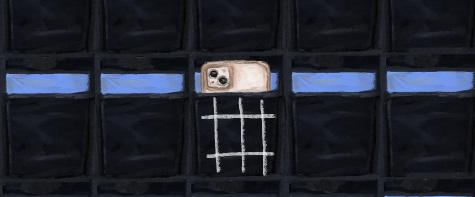
teachers and students can decide what is best for their class.”
South’s digital learning coach Brian Hammel said according to the author of Te Anxious Generation Jonathon Haidt, South’s new phone policy is a promising start to a distraction-free environment.
“[Haidt] said that what we are doing at South with regards to a cell phone policy, which is just when you’re in the classroom, is a little better than not having a policy at all,” he said. “[Haidt] ofers a better solution— leave them at home.”
Te new lunch policy ensures that students can only eat in the student center, auditorium lobby, common rooms or outside. Additionally, the School Committee and Superintendent have prohibited food deliveries from outside vendors.
Karpova said since there is not enough provided space for students to eat around the school, students should be able to fnd their own space to eat.
“It's important for students to congregate and eat where they think is comfortable. In the school, there aren't enough resources for everyone to ft comfortably in the auditorium lobby or the cafeteria,” she said.
Jordan-Quern said although the new delivery policy may be confusing to students, it was implemented for their safety.
“Students might have a hard time understanding, or are unaware,” he said. “Teachers think that a random delivery person with no background check entering school grounds and having access to various doors in the building feels unsafe for students.”
Guidance counselor Aaron Lewis said that in the past, food deliveries have caused unnecessary problems within the school.
My hope is that by having the policy in place, it enlarges students' willingness to socially connect with people.
Patrick Jordan-Quern Health & Welness Department Head
“When you order food, you don’t know when it’s going to get here, so you might be coming out of class to get food,” he said. “I’ve also heard of situations where kids have taken food from [other] people, so that creates an issue.”
Karpova said that the new policies are unfair to students who weren’t taking advantage of their privileges.
“Now that they're restricted through so many new policies, students feel the negatives are outweighing the positives,” she said. “Freedom is essential to have, especially at the high school level, and it shouldn't be taken away just because some people were doing things wrong.”
Jordan-Quern said that ultimately, the new policies can help guide the South community in a positive direction.
“I just wish the change came naturally from people,” he said. “We should work together to mitigate certain behaviors, and I think the policies can give us the building blocks to protect each other from things that we fnd harmful.”
South and Newton community reacts to a violent altercation at a pro-Israel demonstration in September
By Risha Sinha
On Sept. 12, Newton police responded to a violent altercation in the Newtonville neighborhood near Washington and Harvard streets.
At a press conference later that night, Middlesex District Attorney Marian Ryan said Newton Police arrived at the scene at about 6:40 p.m.
Tere was a small group of individuals, pro-Israeli demonstrators, who were demonstrating on one side of the street,” she said.
“Tere was an individual randomly walking down the other side of the street. Words were exchanged back and forth across the street.”
Court documents identify Caleb Gannon, 31, of Newton, as the individual walking on the opposite side of the street. Te incident started when he began shouting at the demonstrators.
In a video apparently capturing part of the confrontation, Gannon can be heard yelling that the protesters “are defending genocide.”
Te footage then shows Gannon running across the street and jumping on someone.
Ryan identifed the alleged shooter as 47-year-old Scott Hayes of Framingham. In the video, Hayes can be heard saying, “grab my pistol,” before an altercation ensued.
Surveillance footage confirmed that Gannon tackled Hayes to the ground, after which Hayes shot Gannon in the abdomen.
Hayes and others at the scene provided frst aid to Gannon before he was transported to a nearby hospital. Gannon is expected to recover.
Both men now face legal action. Hayes was arrested and charged with assault and battery with a dangerous weapon, as well as violation of a constitutional right causing injury, and released on bail. Gannon was summonsed for assault.
Hayes' attorneys entered a not guilty plea in court. Hayes’ defense attorney Glenn MacKinlay said that Hayes shot Gannon only in self-defense.
"Tis is a textbook case of self-defense," said MacKinlay. "We're confdent that the investigation, when it's completed, will clear Mr. Hayes of all charges."
Te shooting occurred amid protests related to the war in Gaza, as the confict passes its one-year anniversary.
At a press conference on Sept. 12, Newton's acting police chief, George McMains, said the department would increase its presence around potentially sensitive areas in response to the tensions.
“Te Newton Police Department will be providing extra patrols at the houses of worship over the next several days, as well as beyond, if we feel that’s appropriate or necessary,” said McMains.
Jewish organizations Betar USA, Shields of David and HERUT Canada called for a travel and business boycott of Newton until charges against Hayes are dropped.
Now over a month since the incident, discourse has largely moved online.
In a resurfaced Instagram story, Gannon shared a screenshot of an X post reporting that the U.S. Ambassador to the United Nations vetoed a ceasefre proposal in February and called for the dismantling of the United States.
Meanwhile, Hayes has previously posted on X about his involvement in pro-Israel dem-


"If you're conducting business with a Newton address you will not have success, you are boycotted," said Alexander Minn, the executive director of Betar USA, a Zionist youth movement.
Te Jewish Community Relations Council of Greater Boston, ADL New England and AJC New England, said in a joint statement that they oppose the proposed boycott.
“We unequivocally reject this tactic, which seeks to place ‘blame’ or ‘consequences’ on local businesses that are not responsible for either the incident or its prosecution,” they said.
onstrations. In a May post, he shared a photo of a gun with the caption, "Hey Jew haters. Bring it."
A GoFundme campaign for the legal defense of Hayes has raised more than $267,000, with more than 3,000 donations made. It was started by Yael Magen of Marblehead through an account named “YM-Fighting Anti-Semitism.”
Te Boston-based group Muslim Justice League held a vigil in support of Gannon on Sept. 25 in Boston Public Garden.
Principal Tamara Stras said that while South faculty prepared for more of a student
response to the event, the climate at school remained relatively unchanged.
“We were prepared well, and every teacher received resources on how to talk to kids and everything was sent out that morning. But, honestly, there really wasn't much chatter within the building. I was walking around, and it seemed like for the most part, kids were doing okay,” Stras said.
Still, Stras said that Newton Police and South administration took the standard measures to make sure everyone in the building felt safe.
“NPD had patrol cars in diferent areas, and our School Resource Ofcer was assigned to this area, so he was here at the beginning of the school day and said hello to the staf. I think that was reassuring for them,” she said.
“ We ofered a restorative circle like we always would, so kids have the space to process.”
In a restorative circle, all participants are given a chance to share: the person with the talking piece speaks, and everyone else is required to listen.
History teacher Jess Engel said that Alan Reinstein, English teacher and South’s Restorative Practices Coordinator, used this structure to facilitate a meaningful discussion.
“Mr. Reinstein made it a comfortable, safe space for people to share how they were feeling and what kind of support they needed,” she said. “Te most important part was that he ended by asking what made people feel hopeful.”
Reinstein said that the war in Gaza, the topic that sparked the instance of violence, polarizes the student body in a way that dampens some benefts of the restorative circle.
“While these circles have been opened to the entire community, they have not been the kinds of circles where people are listening to people who have diferent points of view,” he said.
“With this particular issue given the violence in the Middle East, there's this almost unspoken understanding that to listen to points of view that feel oppositional would be too provocative.”
Engel said that the progress of restorative circles merits continued investment in them.
Te circles are a really powerful way to give people the opportunity to process and get support,” she said.
“We just need to keep working on making sure that that's really accessible. If we're saying that these spaces are safe, that needs to be the case for everyone. As I told Mr. Reinstein, this work is just beginning.”
Tis November, Ballot Question Two will ask Massachusetts voters if the Massachusetts Comprehensive Assessment System (MCAS) should be repealed as a high school graduation requirement. Tis would not eliminate the test itself, only make it irrelevant as to whether or not a student is able to graduate from a public high school.
Students start taking the MCAS in third grade, and if you go to public school in Massachusetts, there's a good chance you don’t think of MCAS testing days too fondly. Blankly staring at slide after slide of multiple-choice bubbles is not how students want to spend an early morning.
However, since as early as age eight or nine years old, this test has been part of our routine, a nuisance that we had to get out of the way before continuing with usual lessons. Te anxiety associated with other tests is largely not felt about MCAS and accordingly does not signifcantly hinder a student’s experience in the classroom.
A signifcant amount of the pressure that usually comes with assessments is far less present in the case of MCAS, as students are so accustomed to regularly taking the test since such a young age – plus, the scores do not impact students’ grade in their class, or aim to holistically speak to their performance in a specifc course.
Instead, the test assesses understanding of each subject’s most basic core concepts within the statewide curriculum teachers are already required to cover. Taking MCAS out of the equation will not change how class curricula are structured, as it does not change or include any additional objectives, leaving no lasting efects on learning.
Besides, all high schools in Massachusetts have individualized graduation requirements. At South, we must meet subject requirements for all of our core classes, including an elective requirement. MCAS isn't a huge deviation from what we already have — it’s simply standardized across the state.
If the MCAS were to continue being a graduation requirement as it is now, it won’t be the sole determining factor between a student and their diploma. Te state ofers alternatives to those who do not pass MCAS, including students with learning disabilities, ofering such students the option to submit an academic portfolio that assesses the same standardized education standards as MCAS aims to.
Tese standards are not entirely dependent on MCAS; the test is used as one way to maintain a baseline level of education across the state.
It is important to acknowledge that our perspective does not refect the experiences of all Massachusetts school districts. As students

Te Lion’s Roar, founded in 1984, is the student newspaper of Newton South High School, acting as a public forum for student views and attitudes.
Te Lion’s Roar’s right to freedom of expression is protected by the Massachusetts Student Free Expression Law (Mass. Gen. Laws Ann. ch. 71, Section 82). All content decisions are made by student editors, and the content of Te Lion’s Roar in no way refects the ofcial policy of Newton South, its faculty, or its administration.
Editorials are the ofcial opinion of Te Lion’s Roar, while opinions and letters are the personal viewpoints of the writers and do not necessarily refect the opinion of Te Lion’s Roar. Te Lion’s Roar reserves the right to edit all submitted content, to reject advertising copy for resubmission of new copy that is deemed acceptable by student editors, and to make decisions regarding the submission of letters to the editors, which are welcomed.
Te Lion’s Roar is printed by Seacoast Newspapers and published every four weeks by Newton South students. All funding comes from advertisers and subscriptions.
In-school distribution of Te Lion’s Roar is free, but each copy of the paper shall cost one dollar for each copy more than ten (10) that is taken by any individual or by many individuals on behalf of a single individual. Violation of this policy shall constitute theft.
in the Newton school system, we recognize that we speak from a position of privilege in a wealthy, afuent town known for its exceptional public school system.
Not all districts are aforded the same amount of resources to meet certain educational benchmarks as easily as schools in Newton, so steps must be taken to ameliorate these discrepancies. For there to be meaningful progress toward equity in education, the state must know where more of its resources need to be allocated.
Te scores collected by the MCAS serve as a standardized data point to identify schools that are not meeting education standards and holds them accountable, addressing concerns about underprivileged school systems.
Accurate test scores paint an accurate picture of where the districts are falling short, and therefore are a crucial way the state can collect information. If the test does not have any impact on students’ academic future whatsoever, the chances for skewed data increase – there may be fewer people taking the test, or not making a real attempt, and the lack of an incentive to succeed could result in an inaccurate snapshot of students’ true abilities, limiting the state’s capacity to provide help where it may be urgently needed.
MCAS is not a rigorous, insurmountable barrier put in place by elitists meant to
prevent students from graduating, but rather a vital benchmark that ensures Massachusetts is providing students what they are entitled to, and deserve – the quality education the state is obliged to properly provide.
High schoolers know better than anyone that standardized tests can be frustrating – but since we’ll have to keep taking the test anyway no matter which way the vote swings next month, the students in Massachusetts might as well get something out of it.
Te MCAS graduation requirement should be used as a tool. It is the state’s responsibility to provide every single student with the resources to meet a baseline education requirement before their adult life. Voting“No” is a step in the right direction toward every student in Massachusetts receiving the education they deserve.
Make sure you vote on Nov. 5!
Check your polling location here:
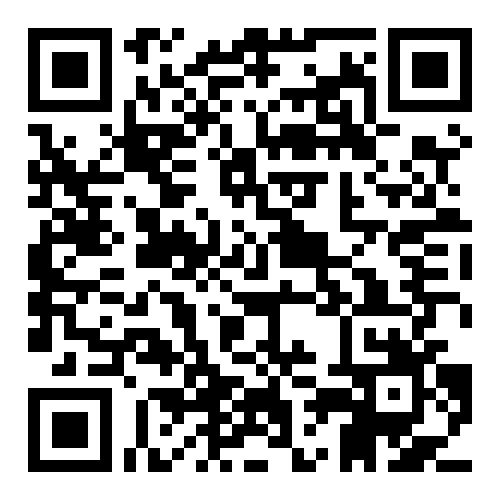
Newton South High School’s Student Newspaper
140 Brandeis Road, Newton, MA 02459
ss.lionsroar@gmail.com
Editors-in-Chief
Grace Dempsey
Andrew Feinberg
News
Hana Futai
Jenny Lee
Ellie Shim
Risha Sinha
Managing Editors
Julia Lee
Teo Younkin
Section Editors
Alex Zakuta Centerfold
Irene González de las Casas
Ava Ransbotham
Features
Laura Feng
Sarah Schwartz
Bethesda Yeh
Photo Managers
Tayer Bialek
Tate Slater
Opinions
Max Hubbard
Jacob Lewis
Angela Tao
Grace Yang
Sports
Charlie Bluestein
Joey Giragos
Sarah Schwartz
Graphics Managers
Clare Cho
Lynn Kim
AJ Nguyen
Faculty Advisor
Ashley Chapman

Julia Lee Managing Editor
My happiest moments as a kid were spent getting kicked in the shins, smacking my head into a ball and doing sprints up and down a feld.
I was convinced I was just one well-placed shot away from becoming the next Alex Morgan. Te thrill of a game day, the excitement of scoring a goal — every bruise was worth it.
As I navigated through sophomore year, my priorities began to evolve. Te carefree days of childhood where soccer drove my week gradually gave way to the complexities of academics and extracurriculars.
My dreams at night shifted from Olimpicos and hat tricks to trig equations and half-fnished essays. Te “D” I was trying to work around wasn’t the defense on the feld anymore — it was the grades on my math tests.
Even with the math-induced panic, the thought of quitting soccer felt like betraying my entire childhood. I couldn’t admit that all those years of early morning practices, grass stains and farmer’s tans were for nothing.
I couldn’t let go of the future where I was playing professional soccer, practicing medicine as a world-renowned physician and reporting for a major publication — achieving every one of my aspirations without compromise.
Eventually the reality of my grades sunk in, and I had to quit club soccer. As upset as I was about losing that part of my identity, the world kept spinning, my grades were up again
and exercise felt like a reward instead of an obligation.
I was starting to feel okay about hanging up my cleats until the whirlwind of senior year hit me with another tough decision.
In elementary school I joined the school band, toting my clarinet case to school every day. I continued embracing the identity of a “band kid” through middle school and into high school.
Music became an essential part of my week, ofering a much-needed creative outlet
semble last year unlocked a new world of musical exploration. Not only was I challenged by the improvisation and intricacies of jazz, but the close-knit ensemble provided a sense of camaraderie reminiscent of the sports team I had lost. Trough jazz, I discovered a renewed avenue for self-expression and creativity.
A week into this school year I was faced with the choice of taking either a science course or staying in Jazz Ensemble.
I had quit soccer to focus on academics. Two years later, I encountered the same prob-
By letting go of formal commitments that once caused me stress, I was able to prioritize new responsibilities and appreciate those old passions for the reasons I fell in love with them in the frst place.
that balanced the competitive nature of my sports life.
When I quit soccer, I found myself naturally gravitating toward music, dedicating more time and attention to it than ever before. Te energy I had once poured into sprinting down the feld and strategizing plays was now channeled into attacking notes and perfecting my rhythm.
Joining the Newton South Jazz En-

still fnd solace in music — on my own terms. Just like quitting soccer hadn’t erased my love for the game, stepping away from the band didn’t mean I had to stop enjoying music altogether.
Clinging onto soccer and music just because they were once my highest priority wasn’t fair to the person I had become or new passions I had developed. My evolving pursuits in journalism, tennis and community service gave me fresh challenges and fulfllment that align with my aspirations for the future.
Letting go of formal commitments that had become unnecessarily overwhelming enabled me to prioritize new responsibilities and appreciate those old passions for the reasons I fell in love with them in the frst place.
After a difcult day of school, I fnd comfort in taking out my clarinet or saxophone and practicing solo pieces. It is reassuring to know that the part of me that thrived on music is still very much alive; simply playing in my room is enough to keep that passion kindled.
lem, with a diferent passion. I was retiring the “band kid” label for one that felt worse:“quitter”. Letting go of my two longest passions was a complete departure from my childhood dreams.
It wasn’t until I dejectedly sat down to write a parting email to my band director that I had a moment of clarity — leaving the band didn’t have to mean quitting music entirely.
Maybe I wasn’t going to be in rehearsals or performing in concerts anymore, but I could
Freeing myself of childhood priorities allowed me to step back from the confnes of interests that once shaped me, allowing me to explore who I am now.
So maybe quitting isn’t the dirty word we’ve made it out to be. It’s just a part of growing up — learning to shift priorities, giving yourself permission to let go of things that no longer serve the person you’re becoming.
If being a“quitter” means having the courage to make room for new goals and growth, then maybe we should all be a little better at it.

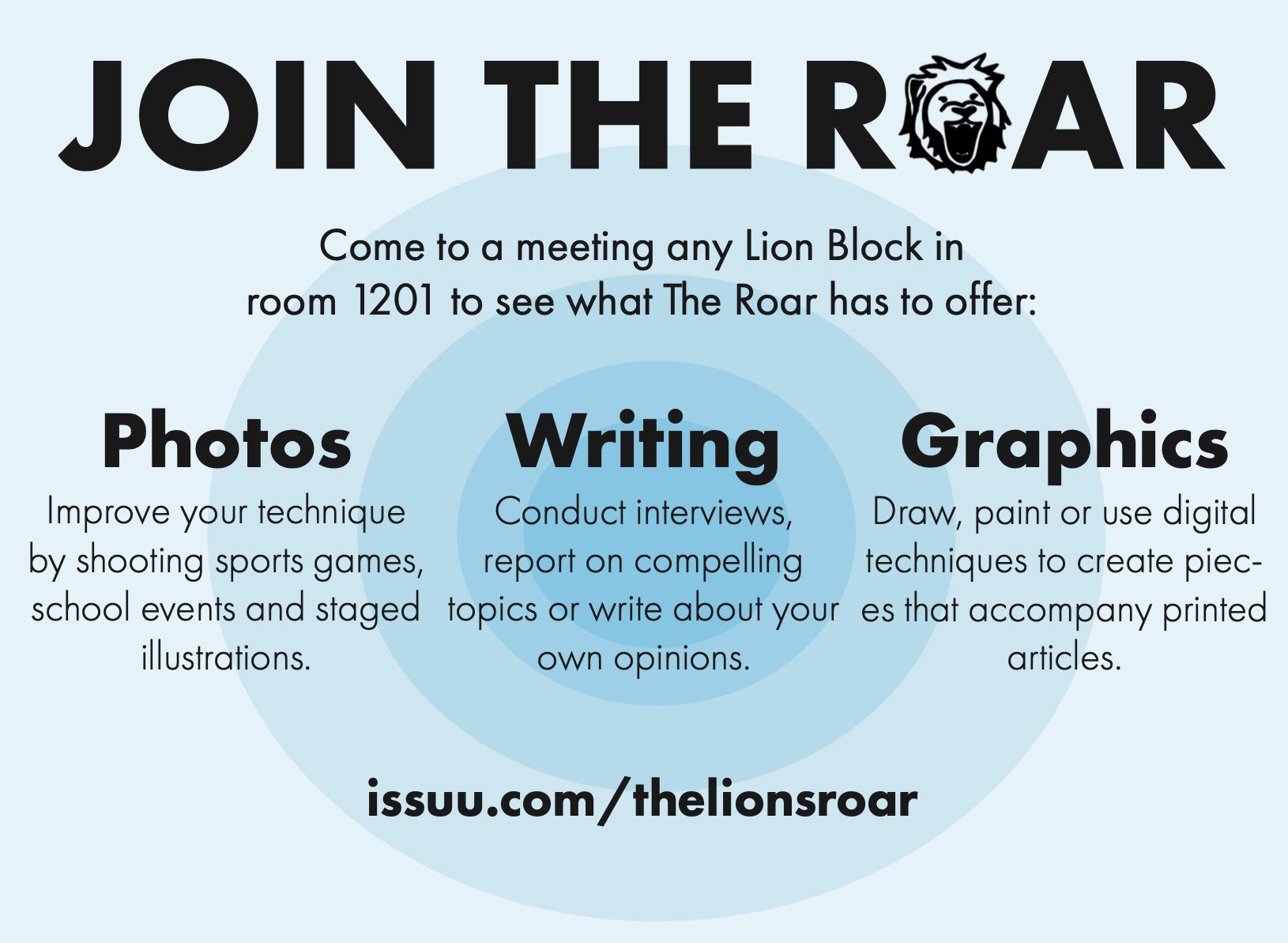
On Sept. 4, Apalachee High School in Georgia experienced a horrifc, yet preventable, tragedy: 14-yearold Colt Gray left class and returned with an AR-15-style rife in his bag. He opened fre, killing four people.
Te shooter’s father, Colin Gray, had gifted him the weapon the previous December after the FBI linked Colt to online school shooting threats in May.
An investigation was opened, and law enforcement visited the Gray household to discuss his online activity.
Yet despite his awareness of his son’s dangerous attitude toward guns, Colt Gray’s father — the person responsible for monitoring and disciplining him — did little to prevent the massacre.
Having purchased the gun used in the shooting, Colin Gray has been charged with four counts of involuntary manslaughter, two counts of second-degree murder and eight counts of cruelty to children due to his role in the tragedy.
His arrest creates a disturbing parallel to a Michigan case from almost three years prior: the Crumbley trials, in which 15-year-old Ethan Crumbley’s parents were convicted of invol untary manslaughter for gross negligence that enabled their son to kill four of his classmates in a school shooting.
If the Georgia case follows suit, Gray’s father will be convicted for his failure to respond to his son’s clear intentions to cause harm.
Both Colt Gray and Ethan Crumbley had a history of poor mental health. In both cases, their issues were brought to their parents' attention through outside sources on multiple occasions; for Colt, it was the FBI, and for Ethan, school o took no action.
Colt and Ethan were neglected to the point that they were able to take their anger out on others.
Prior warning of Colt Gray’s violent intentions — and his father’s awareness of them — is evident. Bodycam footage of the frst interaction between Gray’s father and law enforcement, when Colt was being investigated for online threats, re
cords the former saying that if his son should say anything suggesting he would hurt people, “all the guns will go away.”
Nonetheless, he continued to allow Colt access to the AR-15 weapon, ignoring the obvious warning signs.
Gun control should never have been a matter of “if”. Te minute Colin Gray had heard from the FBI that his son was a subject of notice for making comments about school shootings online, access to weapons should have disappeared immediately, and Colt should have been put in therapy. But that’s not what happened.
Te tragedies of history will repeat themselves unless they are learned from; in a cry for help similar to Colt Gray’s online threats, Ethan Crumbley had habitually drawn graphic images of a gun, bullet and wounded man before committing the shooting.
them with the means to spread their hurt to others.
Our current reality is devastating even without considering the subject of parental involvement – or rather, the lack of it. A new school shooting seems to occur every week or so.
Children as young as fve years old routinely drill what to do in such a traumatic event: hide in the corner of a classroom, stay silent and hope the danger will pass.
But what can the world do to protect children if the dangers are not just outside the classroom but inside their heads? Who could protect a child — and, by proxy, any others
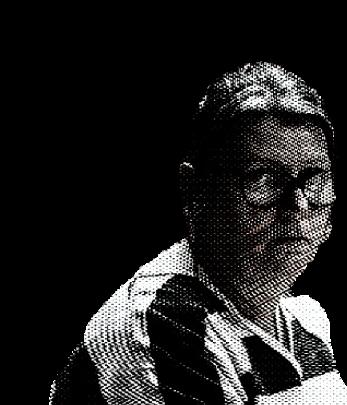
Who could protect a child — and, by proxy, any others involved — from themselves?
there exists a chain of events that may explain why someone made the decisions they did. Te lack of a stable household, mental health resources and parental guidance while being encouraged to use a gun often creates
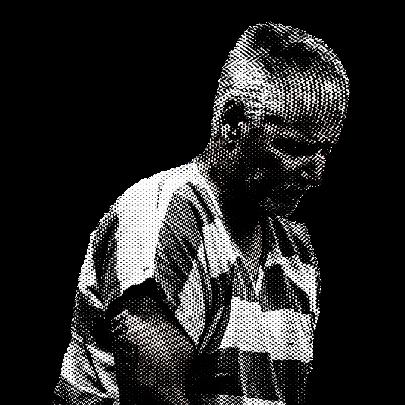
Colt Gray, as his grandfather put it, “did a horrendous thing — there’s no question about it, and he’s going to pay the price for it”, but he “did what he did because of the environment that he lived in.”
Colin Gray’s encouragement of guns in his son’s life – evidenced by his giving Colt a weapon and teaching him how to use it – directly led to the shooting.
In both the Crumbley and Gray cases, the shooters’ parents had tangible and alarm-raising indications their child was about to do something drastic: there were the disturbing images Ethan had drawn and the online threats Colt had made. In both instances, the parents took no action.
A student walked into school one day, four lives were taken and countless others were marred forever. eir parents have no right to claim ignorance of their children’s mental state to justify their inaction. A caretaker’s inherent responsibility is to attentively care for and watch
Cultivated by their caregivers, the values and environment where a child is raised are the basis of who they eventually become. If that foundation is unstable or built on broken morals, everything constructed will inevitably come crumbling down.
By Ria Santhanam
It's startling to imagine a society where proft is placed above justice, yet that’s the reality in many systems today.
Tis distortion of incentives is especially evident in the prison system, where institutions prioritize punishment and pro over rehabilitation.
that prisons, while designed to detain those who break the law, would still operate with a degree of humanity.
years, this has shifted, with pris ons increasingly functioning as pro than centers for reform.
als convicted of severe crimes or those guilty of minor offenses, the fo
cus on fnancial gain has warped the original purpose of incarceration.

What seems like a straightforward system hides deep-seated corruption. Te exploitation within prisons is slowly coming to light, particularly in the United States, where overcrowded facilities, inhumane broken system.
At the heart of this crisis is the prisonindustrial complex (PIC), a symbiotic relationship between government and private corporations that seeks to proft from incarceration.
Te PIC operates on the premise that private prisons, often more proftable than their public counterparts, can generate revenue through contracts with the government.
Tis growing partnership enables private companies to take control of prison management, sidelining government oversight. As writer Sean Bryant points out, these companies manage inmate classifcation and oversight, all in the name of proft.
Te Federal Bureau of Prisons and state departments enforce the PIC, which ofers some economic benefts—such as jobs for companies seeking cheap labor and access to a steady supply of prison labor.
However, these benefts fail to address the larger societal issues that the PIC perpetuates, including racial and socioeconomic injustice.
According to activist Angela Davis, the U.S. prison population disproportionately consists of non-white individuals, with black women being one of the fastest-growing groups of inmates.
Tis highlights the exploitation of marginalized communities, as people of color face far higher incarceration rates than their white counterparts.
Te prison-industrial complex not only upholds these racial disparities but also profts
By Cameron Negahban
Te coveted free block: a precious oasis amidst the daily grind of classes.
It’s meant to be a productive period, but despite having three blocks free every week, I rarely use them to make progress on the colossal homework pile I’m tasked with conquering daily.
Instead, I often fnd myself preoccupied with a life-or-death online chess game. So, who’s the culprit here: me or the free block?
In my defense, it’s difcult for anyone to get work done during free blocks. Whether you’re holed up in a library cubicle or at a designated academic center, distractions at school inevitably hinder productivity.
Although we have fantastic teachers and resources available here at South, the only way to access them is through WIN Blocks — given that you’re lucky enough to land a spot with the teacher you want to see.
Even then, your teacher may not be able to help everyone in the block’s short 50 minutes. Plus, teachers aren’t typically available during other blocks, so you can’t really plan on using your frees for check-ins or retakes. If you struggle to understand a concept or are stuck on a homework assignment, you’re out of luck.
So, if I’m not going to get my work done during free blocks, are they just a waste of time? While the answer may appear to be yes, fear not.
Tere are countless ways you could spend your free blocks, and the more creatively you think, the more options will become available to you.
For one, you could try writing some
songs with your friends. One of my most cherished free block experiences goes back to when I decided to write a song for the Divine Admission Deities at Harvard. We wrote some intense lyrics: “Harvard, Harvard, we’re the smartest of them all. Our brains are huge; we’re standing tall!”
Although I haven’t heard back from Harvard yet, I feel pretty good about my chances
(like me). If you're lucky, you might just come up with a hit that'll make you a millionaire!
However, if you’re not as musically inclined, consider using your free blocks to try getting some extra credit.
Personally, my favorite method is going to Dunkin' and grabbing a donut for my teacher. I remember trying this for one of my science exams.
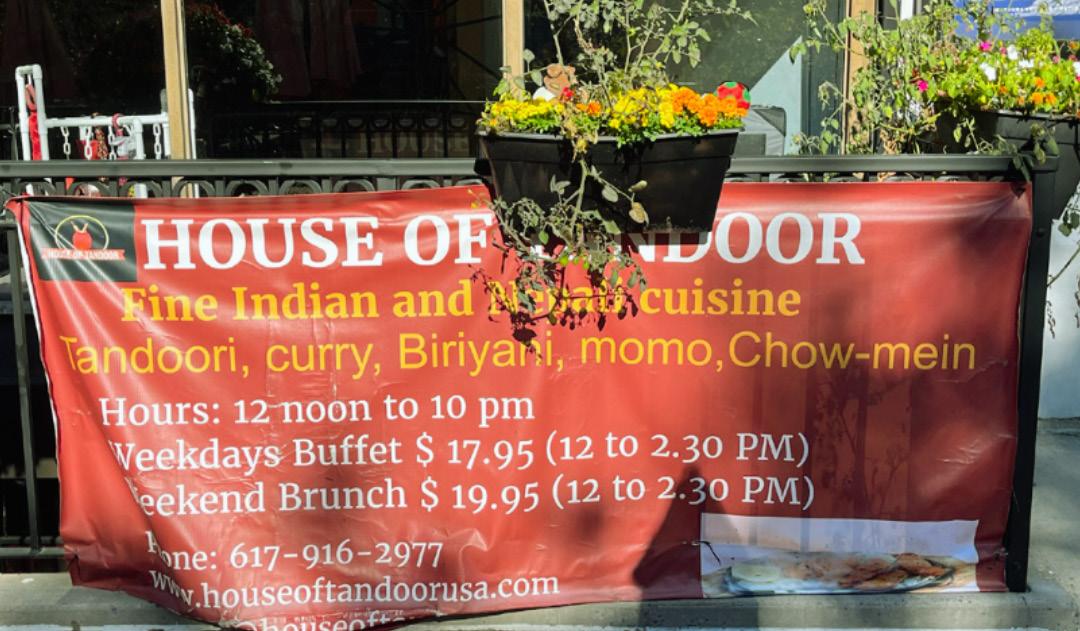
— although I admit, the lyrics weren’t quite Taylor Swift-level. Regardless, writing songs is an excellent way to pass the time during a free, as it allows you to innovatively express your thoughts.
I would recommend songwriting to anyone possessing a command of language
As I walked into the room, Dunkin' bag in hand, my teacher stared at me like I was the second coming of Albert Einstein. Although I wasn’t exactly proving the Teory of Relativity, my donut was probably the second-best thing. I never got the extra points, but it was worth a shot.

from them, worsening the already severe conditions these communities face.
Rather than promoting reform or equality, the PIC exacerbates racial stereotypes and underlines the lack of support provided to those in the prison system.
What seems like a straightforward system hides deep-seated corruption.
Te drive for proft is deeply intertwined with the racial patterns of incarceration, with private companies motivated to increase their revenue by intensifying the already harsh treatment of underrepresented racial groups.
Mass incarceration, driven by the economic incentives to build and maintain prisons, often results in unjust imprisonment—especially for people of color.
Nazgol Ghandnoosh, a researcher, emphasizes that "people of color—particularly African Americans—experience imprisonment at a far higher rate than whites."
Beyond racial inequality, the very concept of profting from prisoners highlights the moral faws of the PIC.
Prisoners continue to be exploited, further entrenching the racial and economic inequalities that led to their incarceration in the frst place.

As outstanding as writing songs and getting Dunkin' is — in my expert opinion — there is only one way to ensure a perfect free block: the $17.95 bufet at the esteemed House of Tandoor.
Located in Newton Center, this Indian restaurant will make your taste buds dance with joy. Te tantalizing aroma of exotic spices envelops you from the moment you step inside, promising a culinary adventure like no other. Few restaurants in the area have mastered the culinary art like House of Tandoor has. Indeed, their chicken tikka masala, basmati rice and naan are some of the best that I have ever had at any Indian restaurant (not sponsored, though I’m open to any ofers).
Te next time you fnd yourself stuck in a boring free block with nothing to do, do yourself a favor and make your way to House of Tandoor.
To paraphrase the words of the late great William Shakespeare, “If music be the food of love, play on; but if it’s Indian food, head to House of Tandoor.”
Amidst the hustle and bustle of the school day, free blocks are a rare oasis of tranquility. It is a time when we can let our imaginations soar, explore our passions and savor the simple pleasures of life.
Whether we choose to unleash our inner Chopin, ofer sweet surprises to our teachers, or indulge in the exquisite favors of House of Tandoor, we must seize the opportunity to escape the monotony of routine and embrace the joy of the moment.
This November, Massachusetts voters will decide on the future of the MCAS test. If Ballot Question 2 passes, the exam will no longer be a high school graduation requirement

Standardized testing is not an accurate measure of learning, so the MCAS test should not be a graduation requirement.
Due to the current state testing mandate, students tend to spend more time preparing themselves for the tests instead of focusing on the knowledge and skills they will need to succeed after high school.
Tis approach normalizes an academic culture that prioritizes students obtaining a basic understanding of a fxed curriculum in order to succeed on a standardized test. Tis learning environment inherently suppresses intellectual curiosity.
As such, Massachusetts high school students are not only missing key concepts that extend beyond the test curriculum as they prepare for the MCAS, but are also losing the opportunity to enhance their learning experience by taking a deeper dive into material that doesn’t appear on the exam.
This test-based approach to education also afects teachers, who are forced to adjust their teaching to match what is covered on the test.
The Massachusetts Teachers Association and American Federation of Teachers thus propose an alternative program to establish classroom settings that allow students to thrive academically, extending the curriculum beyond the basics that would be covered on the test.
Tis change is vital because it allows students to succeed by focusing on more than just test prep. By dropping the MCAS requirement for graduation, schools can emphasize projects, teamwork and critical thinking.
Tis approach prepares students for real-life challenges and lets them explore their interests. It also enables teachers to use diverse teaching methods, making education fairer by assessing a broader range of skills instead of just test scores.
As it’s used now, MCAS is inefective because it ultimately forces teachers to focus on required course material instead of the life skills students need after high school.
As a result, many students graduate without the knowledge and skills
By Bella Promuto

necessary for college or the workforce.
Furthermore, national studies have shown that standardized test scores often refect the environment a student is in and the resources they have for test preparation. Limited resources can prevent these scores from accurately representing a student’s true abilities or the quality of their education.
Instead of being used to measure intelligence or a school’s efectiveness, these tests can be more about access to support, preparation and building skills.
For example, a student with more resources is far more likely to do better on the MCAS because of that access to support. On the other hand, a student lacking these resources is likely to per-
graphicbyRishaSinha
Based on academic trends respective to post-secondary success, the state must enforce MCAS as a graduation requirement for the beneft of students and administrators alike.
Te current system is crucial to maintaining a state-wide uniform curriculum, promoting a strong student work ethic, pursuing equity in academic support and funding and setting adequate graduation requirements across the state.
With 351 school districts and over 400 high schools in Massachusetts, the absence of standardized testing as a graduation requirement would allow student performance not meeting basic academic thresholds to go unaddressed.
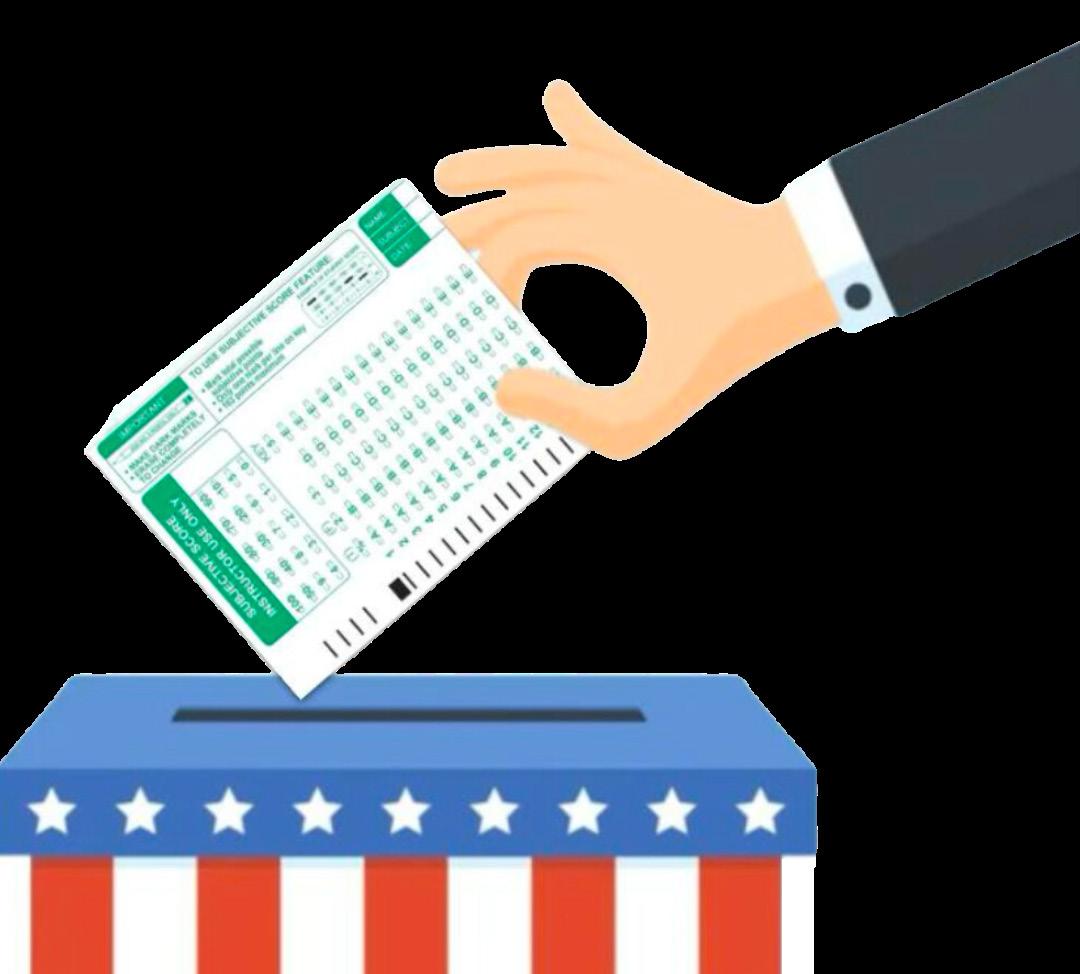
ments may also take over students' schedules. Tese many stress factors and responsibilities overwhelm students, afecting their scores and mental health. Tis also impairs the legitimacy of the MCAS.
Te restrictive nature of standardized testing like the MCAS not only undermines the educational experience but also stifes creativity and critical thinking, ultimately limiting students' potential to thrive in a complex world.
ing and resources would fall behind, as they would not be able to develop as diverse curricula as more privileged districts, furthering the equity gap.
Additionally, with varying requirements, the value of a high school diploma would be diminished. T e refection of a consistent level of knowledge, demonstrated by a diploma, is compromised by inconsistent graduation requirements. Tis leads to a devaluation of the diploma as a respective indicator
By Isa Folch
of competence.
Universities and the workforce alike use this marker of skill to evaluate baseline levels of critical thinking, writing, and other valuable skills.
What’s more, using the test as a graduation requirement has played a role in motivating Massachusetts students to earn exceptional national rankings for decades. From 2005 to 2011, Massachusetts scored the highest in all four major categories on the National Assessment of Educational Progress test.
Students’ performance has since remained exemplary, and Forbes has nominated Massachusetts as one of the top fve states in standardized testing performance. Te desire to receive a high school diploma leads to positive academic results, so removing the MCAS graduation requirement may prompt less student motivation.
A lack of student motivation could have far-reaching implications: MCAS performance disparities refect which student demographics and districts need further support.
It’s essential for this information to accurately refect students’ best eforts, as it aids in closing the equity gap by enabling the state to provide each pupil with the resources they need to perform well academically.
Te value of MCAS testing can not be understated as demonstrated by research by the Annenberg Institute, which suggests that positive high school MCAS scores strongly correlate to longterm success, regardless of socioeconomic status: Testing indicates whether or not students have the foundational skills they need to successfully thrive in post-secondary life.
Te MCAS graduation requirement ensures students have met foundational benchmarks before they end their high school career, and likewise ensures each student an opportunity to succeed by providing students an understanding of the curriculum, even when their education is compromised due to other preexisting disadvantages.
Te MCAS graduation requirement is vital to providing all students with the opportunity to receive a baseline education, and voters should vote to keep it on Nov. 5.

Why do students love Halloween? Because it's a fang-tastic way to take a break from their ghoul-work!
By Sarah Wang
Halloween is perhaps the most exciting time of year: Who doesn’t like to dress up and get free stuf ? But it can also stress you out … and scare the crap out of you.
For the past few years, my friends and I have spent the three hours before we actually step out the door scrambling between the closet and the bathroom, altering accessories and slapping more lipstick on our faces. Tis year probably won’t be any diferent — hopefully, we won’t shatter any more makeup palettes this time!
Of course, as freshmen we don’t have our driver’s licenses, so the only solution is to transform into leeches for the night and bribe our older siblings to give us rides. (Sorry! Just this one last time before we’re too old to beg for candy.)
But even if we’ve outgrown trick-or-treating, we’ll still scream when the infatable witch at that one super ambitious house grows three times in size and lunges at us. Anything that big is terrifying once the sky gets dark.
Speaking of the dark, by 8:30 p.m., our parents will probably call us to ask about our whereabouts even though they’ve been tracking our locations from the beginning.
So then comes the time when one unlucky parent gets to drive four to lescents back to their place, where they proceed to inhale M&M’s and chocolate bars from the massive pile spread all over the living room rug.
Happy Hal … we swear we won’t throw up this time.
By Kiril Zhdanov
Juniors? Having fun? Have you been living under a rock (or maybe a pile of never-ending homework)? Haven’t you heard from every source, student and super natural entity that junior year is the most difcult, life-draining and time-consuming year of your life?
I mean, let’s look at the facts: juniors are far too busy volunteering, studying and start ing “niche non-prof And don’t even get me started on APUSH — it’s already a-push in the wrong direction.
By Simona Wang
With Halloween creeping up on us, sophomores are morphing into blood-sucking monsters of the night — but not in the cool, mysterious, Edward-Cullen way you expect. It’s worse than that: We’re stuck in the awkward limbo of the high school hierarchy. We’re too young to join the juniors and seniors at the actually fun parties, but technically too old to justify or enjoy trick or treating. We’ll think about egging peoples’ houses — but since we’re too chicken, it never happens.
We stay confned to our few friends, and to do what? We may just stay cooped up in one of our living rooms, eating away our loneliness with palmfuls of candy (and maybe rewatching “Gilmore Girls” for the nth time).
But thank the social media heavens, Pinterest exists. With it, we can get the visual inspiration to bake and decorate cute little Halloween cookies. Who cares if the kitchen looks like a storm swept through it? At least we have royal icing ghosts piped amateurishly onto tiny pastries. It might not be the healthiest activity, but at least lling the Halloween spirit somehow.

And even if we do manage to crawl out of the quicksand pit that is our waning sanity, there will be no quiet moment as we tell anyone who will listen about this amazing college tour we went on last weekend and how UMass really is the school of our dreams.
And so any Halloween plans are either never made, canceled or incredibly simple. After all, why would we need to plan a horror movie marathon or go outside to get jumped by giant skeletons if our to-do lists are already terrifying enough?
So, in an attempt to escape the horrors of adult (or, at least, upperclassmen) responsibilities, we regress back into children and open good old Roblox.
Playing Roblox is, unfortunately, the only way we can express our genius Halloween costume ideas. We can do nothing to celebrate Halloween except design a digital costume so brilliant that it would force any nine-year-old iPad kid to give it fve stars in“Dress to Impress”. Oh, wait. It’s just another cat costume.
And so comes the inevitable sugar high. We — a little too — select the frst horror movie we see on Netfix and worry the whole neighborhood with our screams. We might be too old for Halloween decorations outside to scare us, but that doesn’t mean pixels on a TV screen won’t.
In the end, sophomore Halloween is just a quirky mix of trying to relive the fun while guring out where we really ft in the festivities.
By Becky Lin
s Halloween approaches, most people excitedly channel their inner spooky spirit, transforming their homes into haunted houses with cobwebs, witches and
For seniors, however, the new trend is indoor, in-your-pajamas Halloween parties — because, let's face it, trick-or-treating is so three-years-ago. Why waste your time walking door-to-door when you can have the sweets come to you instead?
Imagine mounds of candy delivered right to your front door with a simple tap of a fnger (convenient, am I right?). You can lay on that lovely couch in the comfort of your own home and wait for your mailorder diabetes to come before your friends arrive.
And once people start fling in, you get to witness the dining room transform into the sugar-flled star of the night. On its table, the potluck-style food bar will materialize. Everyone will be enjoying the collective efort until one person brings a single pack of M&M’s to share. But that’s okay because it’s all part of the Halloween spirit — no real food, only candy.
Traditional spooky Halloween vibes would also be present at our parties (someone’s Alexa will go missing from the kitchen and reappear playing “Bloody Mary” by Lady Gaga in another family’s dining room), but we can skip the creepy decorations this time because a) Who has the time for that? and b) College applications are scary enough.
So rather than being spooky and active, seniors’ Halloween will be relaxing and chill — because it’s the last one we’ll have in the era we can call childhood.


I defnitely feel a little behind.
Unlike some of my senior peers, I did not spend my summer meticulously shaping my college application — I only now fnished the frst draft of my personal statement, and handed in a rushed Common App to one of my Oct. 15 deadlines. Tis was the wrong assignment to procrastinate.
Even worse, it feels like every conversation I have with my friends is underscored by the pressing Nov. 1 deadline for Early Action and Early Decision that is inching ever closer.
Looking around the senior commons, I see laptop after laptop with a “Supplemental Essay” document open and furious typing echoing through the room. I’ve tried — and failed — to keep up with my friends’ progress on their applications, and the atmosphere of stress that I can feel in the halls is making it harder to focus.
But I’m not really worried. While I’m not an admissions counselor, I’m confdent that a lot of the legwork has already been done in past years of high school. My essays cannot change the B+ I got in math last year, so why spend hours stressing about word choice?
Te biggest problem for me has been trying to create a common, streamlined narrative for what is otherwise a very disjointed series of high school experiences.
Every TikTok college counselor tells me that I need a clear spike in my interests and skills. But I like to do a bit of everything, and that’s what I did in high school; stitching together years of programming with interests in ancient history and language has been challenging to explain in “Why Major” supplements.
Tis has drawn me to schools that give me the best of every world: strong humanities programs, curricular fexibility for me to spill over into the sciences, warm weather…
Finding an early decision choice feels like rolling the dice and trying to optimize the many categories that make up a school into one place.
I’ve landed on applying Early Decision to Emory University in Atlanta for its strong political science program along with the ease at which I can take computer science classes along the way.
Regardless of whether I get in or not, doing research on their ideals of interdisciplinary study has raised my hopes and expectations high for many schools I’m applying to.
Picking a major is nothing like the binding decision it feels like on the Common App, and it is not a death sentence if my ever-changing interests shift again.
No matter where I end up, I’ve come to be truly excited for the freedom that going to college entails, and even more excited for the time I don’t have to hear the horrible abbreviation “supp” again.

When “Te Anxious Generation” by Jonathan Haidt hit the shelves on March 26, it sent shock waves through parents nationwide. Te non-fction book details how smartphones, social media and helicopter parenting have ruined younger generations’ mental health.
Brian Baron, AP English Language and Composition (AP Lang) teacher and English Department head, assigned the book as the course’s summer reading and said he did so because its themes are fundamental to understanding our modern world.
“I struggle to think of another piece of rhetoric that has been as efective as ‘Te Anxious Generation’,” he said. “Whether you like it or you don't like it, it has moved the culture.”
AP Lang student Jenna Kriensky said the book’s theme around addiction to technology hit home for her.
“I agree with the novel’s point,” she said. “It was actually kind of ironic. While I was reading it, I had to take breaks to go on TikTok, so I defnitely am patient zero.”
Although Baron agrees with the novel’s central thesis, he said he believes that many of its readers — especially parents — ignore the criticisms of overprotective parenting habits that can be just as dangerous as new technology.
“Part of [Haidt’s] argument is that we ought to be wary of the virtual world. We have to regulate the virtual world. But the other half of the argument is that we ought to encourage more risk taking in the real world,” he said.
“Parents should read it, see the technology, say‘I agree with that already’ and also listen to the part that actually challenges the way they're raising their kids.”
Despite its compelling rhetoric, Kriensky critiqued Haidt’s use of statistics. She said she believes the author wrote with
a narrow lens that supported removing phones altogether.
“Te book cherry picked statistics. My class talked about this, but it fearmongered its readers, since they are primarily parents,” she said. “[Haidt] did it to support his points.”
However, Baron said he fnds there is no reason to doubt the statistics’s context.
“Te [statistics] in the book; I've seen them in other places, and they show that there is a sharp increase in teenage mental health problems starting around 2012,” he said.
“Tat happened for a reason, and if it didn't have to do with social media and technology, I have yet to hear a compelling explanation.”
After multiple negative incidents around cell phone use at F. A. Day Middle School, Principal Jackie Mann applied to the Department of Elementary and Secondary Education (DESE) for a grant that would partner with cell phone holder company Yondr to limit cell phone usage in school.
Te company provides pouches that lock phones away during school hours and can only be opened by teachers.
Mann said that this decision was motivated by protecting students from the negative implications behind cell phone usage — especially mental health issues revolving around social media.
“Kids are going through a developmental stage where they don't know who they are, and they're trying to fgure out how they ft in. And then you layer on access to social media, where it's all about labels, and belonging and who's liking you or who's not,” she said.
“It just amplifes some of the negative
South tries to repair the disconnect created by
things that we navigate in middle school.”
North Digital Literacy teacher Rob Greenfeld said that these risks extend past middle school into high school.
“It's not so much that the phone is bad, it's what the phone is taking away from. When we're on the phone, we are not having face-to-face conversations with people,” he said.
“At young ages the ability to have those face-to-face conversations, both ones that are comfortable and ones that are not, is super important to social-emotional development.”
First-year PhD student Beatriz Perret has moved far from her family in Venezuela to attend Boston College’s Lynn School of Education. Even though technology can provide an avenue for connection, Perret said it can also have an isolating efect.
“Moving to cities where we can pursue our careers involves being away from my closest friends and family. Even though I have tons of friends in Boston, I'm still constantly managing relationships in person and remotely,” she said.
“If I only had those remote relationships, then I would feel very alone.”
Feelings of isolation are especially dangerous for teenagers whose brains are
You have to think sloppily before you learn to think clearly. And AI is going to get in the way of students' education.
Jennifer Morrill History Department Head
By Irene González de las Casas
still developing. Mann said that as an educator, she has the responsibility to protect her students’ well-being, particularly when it starts to afect their learning.
“If someone has a fragile state of mental health, [social media] really is the thing that could absolutely tip them to the point of being unsafe,” she said. “How are kids going to want to learn if they don't feel safe and comfortable showing up?”
When ChatGPT was released on Nov. 30, 2022, History department head Jennifer Morrill began to worry that the new tool would interfere with her responsibility to her students to help them learn.
“High school is a moment to learn how to think, and once you start using [AI], you'll stop trusting yourself,” she said.
“You have to think sloppily before you learn to think clearly. And AI is going to get in the way of students' education. I'm not obsessed with catching kids; I'm obsessed with helping kids fgure out how to learn in this new environment.”
Te humanities have been forced to adapt the most to a new environment where AI tools are widely available to students. In Jan. 2023, the English department held a weekly WIN meeting to discuss the efects of AI in the classroom with both students and teachers.
Over a year later, Baron and the English department recognize that AI is not going away. Baron said that, while they may be imperfect, English teachers have begun to prioritize new ways to assess writing skills, particularly focusing on in-class writing, to adapt to the rapidly evolving AI landscape.
“Knowing how to edit, how to collaborate, how to use AI ethically, are going to become really valuable skills,” he said.
“And I think to some extent, our reactionary position that you have to write it in-class is an expression of our own fear about learning and learning how to fgure out how to use the AI ethically.”
Morrill said that while she understands the benefts that AI provides, she also understands that teachers need to educate students about the tool.
“We need to learn how to use [AI] efectively, and we also need to teach kids to be aware of its pitfalls,” she said.
“We have a responsibility to teach

about it, to use it ourselves, to fgure out what it's good for and what it isn't and then to set our classes up in a way where our assignments are as AI-proof as possible.”
Morrill has been experimenting with using AI to create test questions; however, she said that she distinguishes her usage of AI and students using it to replace thinking.
“I am doing a great deal of thinking in the way I'm using that tool,” she said. “I know enough history to be able to edit those [test] questions. Te real problem is when people who don't know and have no way
to judge the accuracy of the information are using AI.”
Having researched the efects of AI education in schools, Perret said that applications like Morrill’s can improve connections between teachers and students.
“AI is also a way to reduce teachers’ workload, so more time is spent developing human connection,” she said.“Tis connection is something that teachers want, or maybe even pursued their careers for, but have been missing out on because of demands like grading or lesson planning.”
However, AI presents an easy and tempting way to cheat. Baron said that this reality has caused a rift between students and teachers.
“From a teacher's point of view, you try to form bonds with your students, and when they give you something they didn't do, it feels like there's a breach in the relationship. It feels emotional,” he said.

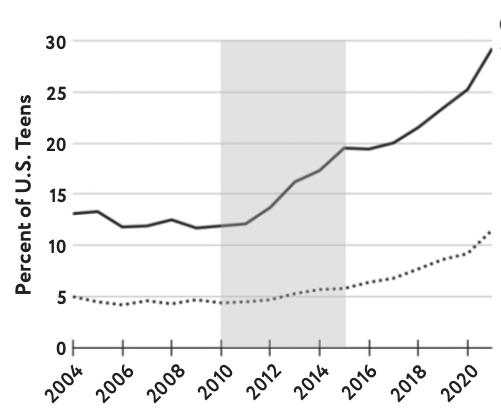
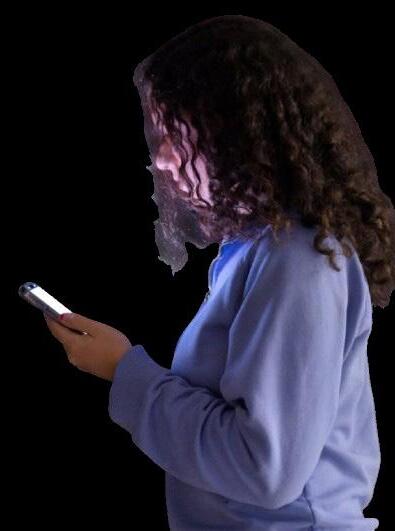

https://issuu.com/thelionsroar/connection-error-continued

Many teachers feel that phones in the classroom not only enable cheating but also serve as an additional disruption to student education. Sporadically implemented last year, classroom phone holders became a district-wide policy at the start of the 2024-2025 school year. Greenfeld, who helped develop the policy, said that the desire to preserve human relationships was at the core of his reasoning.
“It's nobody's fault that this is the position that we were in, but [phones] were exhausting for a lot of folks,” he said. “It created a lot of confict between teachers and students, and [those] relationships are super important to learning environments.”
Removing the distraction of phones during learning hours can be benefcial, but Baron said that more extreme steps would be unrealistic.
“If there's a danger of technology, the solution is never going to be that we just don't use [technology] at all, because it's so ingrained in our lives that it's kind of inescapable,” he said.
Given how ingrained into society AI has become, Perret said that only an understanding of the technology enables responsible usage.
“[AI] is changing how we work, how we live — it's in everything,” she said. “It’s very important for us as consumers of a technology to understand how it's recommending us things. Even if you never create AI, it's about being able to then demand from the government or businesses or schools that we're protected and that we have a say in how our lives are shaped.”
North senior and student in Greenfeld’s digital media class, Asher Salmon Hansen said schools could protect students through technological education.
“[Technology] is advancing at such a quick rate that if you're not educating people at the same rate [at] which it's advancing, people might fall behind in knowing what they're
actually interacting with,” he said.
Part of the funding for the Yondr program will go toward that educational component, something Mann said she and other teachers made sure was included as the State House secured the funding.
“We partner with our students. I believe in student agency and voice, so it also didn't feel great that I was doing something without talking to students frst,” she said. “It’s really important that we’re scafolding it for students in a way they can understand.”
Mann said limiting phones during academic time is already having a concrete positive efect on her students.
“Kids are going on feld trips and talking to each other. Tey are engaging with their teachers. Teir focus is better,” she said. “It felt to the kids like we were blaming them. We're not blaming them. My cell phone is right here, right now. It’s a true addiction.”
For older kids with more self-control and independence, Kriensky said she isn’t sure tak-
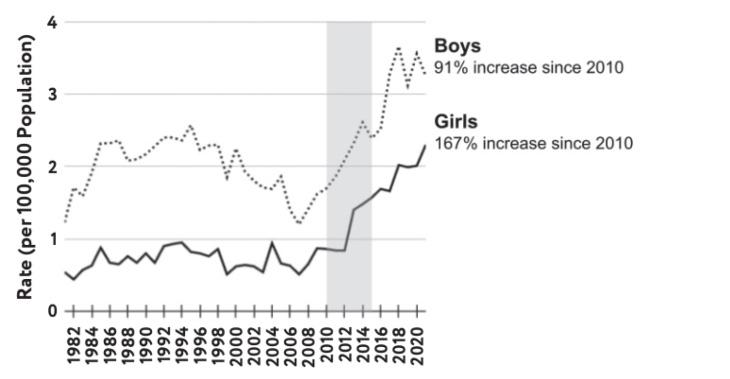


ing away phones altogether is the answer.
“I defnitely agree with it being in the holders during academic periods. I think that's totally justifed. It actually has helped me a bit, but during WIN blocks, I don't understand that,” she said. “[WIN stands for] ‘what I need’, and maybe I need to just listen to music and decompress and relax a little bit.”
Given the research showing the detrimental efect phones have on learning and social-emotional health, Greenfeld said he can’t see the policy going away, but thinks there is room for all of us to adjust our individual relationship with technology.
“To take away somebody's computer or phone during the pandemic would not have made any sense. Tat's because that was a lifeline for so many folks,” he said. “But coming out now that we have the in person interaction again, and now that we can be in the same spaces, then now it’s a matter of trying to fnd that balance again.”
If there's a danger of technology, the solution is never going to be that we just don't use it at all, because it's so ingrained in our lives that it's inescapable
Brian
Baron
English Department Head



By Anyssa Lin & Andrew Petrilla
Research hub, study lair, games and puzzles center or spot to hang out with friends: For countless students, South’s Margaret W. Erskine Library is an all-inclusive haven and yearround presence.
Unbeknownst to most, however, is the behind-the-scenes dedica tion of an indefatigable team of three librarians and two library aides, whose diligence keeps the library in order every day.

Having initially worked as an executive in a marketing consulting frm, librarian Jennifer Dimmick, now in her 14th year of working at South, said she was presented with the opportunity to change careers when a larger conglomerate bought her frm.
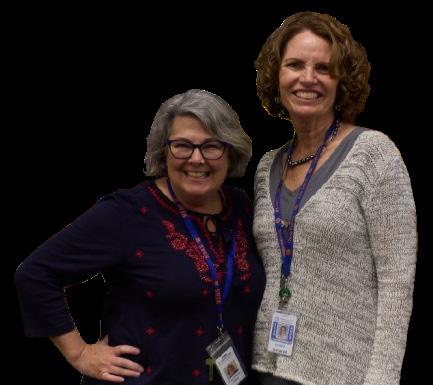

“I wanted to do something less about proft and capitalism and do something that had more meaning,” she said.
After befriending the librarians at her children’s schools and learning more about their jobs, Dimmick enrolled in a graduate program at Simmons University to receive master’s degrees in education and library science.
It was there that she met Margaret Schoen and Katherine Steiger, South’s two other librarians, for the frst time.
Steiger, in her eighth year at South, said that the three of them having known each other since 2009 makes them a stronger team.
“It makes it really easy to work together,” she said. “We all work part time, so we have to be really good communicators to make sure we don't drop the ball on anything.”
Schoen, in her 11th year at South, said that most people do not understand what librarians do on a daily basis. In addition to standard administrative tasks, she said that lesson planning and teaching in collaboration with teachers of various subjects
is a tremendous yet commonly overlooked aspect of her role.
“We have to do both sides of those jobs,” she said. “One day last week, I was literally in the classroom the whole day, working with English teachers for ninth grade orientations.”
To refect an increasingly digitized world, librarians not only ensure available databases are up-to-date and adequate but research new online tools for students as well. Tis year, for example, the library purchased online New York Times and Wall Street Journal subscrip tions.
History de partment head Jen nifer Morrill said that librarians have been an excellent resource. For instance, students can schedule one-on-one appointments with li brarians to get help on their projects.
“Te librarians at South are so good at keeping up with changing ways to access information,” she
said. “Teir secret superpower is their ability to teach kids how to fnd reliable sources that are scholarly.”
For South’s two library aides, Sarah Chen and Sloane Goldhagen, daily duties are more on the technical side. While aides are not licensed to teach, they assist librarians with jobs around the library.
Tasks include checking materials in and out, shelving books, putting together monthly book displays, designing posters, writing the daily survey question, setting up the printing station, checking freshmen in for directed study or canceled class and working at the front desk.
For Chen, in her frst year working at South, maintaining discipline is the most difcult part of her job.
“Sometimes we have students tackling each other,” she said. “I feel that it’s an awkward thing to say, ‘Hey, don't do that.’”
English department head Brian Baron said that student interaction with librarians is sometimes limited.
“Kids are a little bit nervous because the only interaction they have with [librarians] is when they get too loud at a table or something like that,” he said. “I wish that there were ways that students could know them more … Tey're all very friendly, very knowledgeable and very professional.”
personally with students than the role of a traditional teacher.
“Because we're in a unique position, we are less likely to be building and fostering individual relationships where the students really feel like they know us,” she said. “But we need to try to build those relationships anyway because they're really important.”
Te library is also home to the Book Club, Crochet for our Community Club and Knitting Club. Book Club copresident and senior Kate Grabowski said she appreciates the devotion and expertise that the librarians bring to the club.
“I don't know too much about other clubs, but they do a lot more than other advisers,” she said. “It feels like they're going out of their way to get things done for you, [and] they give really good book recommendations.”
Book Club co-president and senior Mary Pierce said she thinks back fondly to a club meeting last year when a graduated member came back to visit.
“Tey were just introducing us, and we had a really nice conversation,” she said. “It was really cool to see how the librarians had created relationships with past students and how those relationships were still holding strong.”
Library aide Goldhagen, in her hopes that students both utilize the library
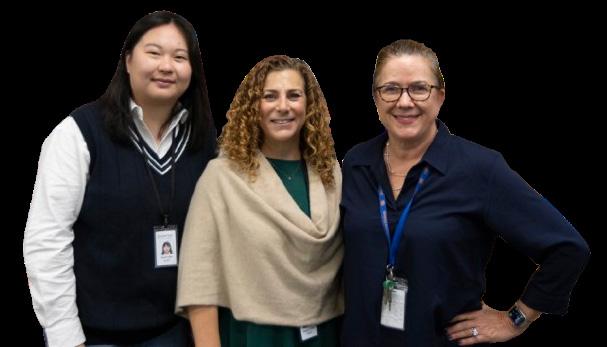
happy to be here, and there's just a nice social atmosphere,” she said.
dents take advantage of this wonderful
Hannah Alexander, Idahlia Brown & Anya Nezafat Features Contributors
Hannah Alexander, Idahlia Brown & Anya Nezafat Features Contributors
During the week of Sept. 15, the Beijing Youth Performance Troupe from Beijing Normal University visited Newton Public Schools (NPS).
During the week of Sept. 15, the Beijing Youth Performance Troupe from Beijing Normal University visited Newton Public Schools (NPS).
After hosting workshops in high school classrooms at South, the artists performed in a gala celebration at North.
After hosting workshops in high school classrooms at South, the artists performed in a gala celebration at North.
Te performance, which was organized by the Global Programs and Global Education Leadership Funds (GELF) program and NPS staf, celebrated the restoration of the Jingshan exchange program: for the frst time since the pandemic, in January 2025, six students and two teachers from NPS will travel to the Jingshan School in Beijing.
Te performance, which was organized by the Global Programs and Global Education Leadership Funds (GELF) program and NPS staf, celebrated the restoration of the Jingshan exchange program: for the frst time since the pandemic, in January 2025, six students and two teachers from NPS will travel to the Jingshan School in Beijing.
Te artists ofered calligraphy and fan painting workshops in South's Chinese classes.
Senior Olivia Hong and freshman Nora Favazza are ambassadors for GELF, an organization that fnancially supports students to participate in exchange programs.
Senior Olivia Hong and freshman Nora Favazza are ambassadors for GELF, an organization that fnancially supports students to participate in exchange programs.
Te gala celebration was GELF’s frst public fundraising event since the pandemic and raised awareness for cultural experiences available to students.
Te gala celebration was GELF’s frst public fundraising event since the pandemic and raised awareness for cultural experiences available to students.
Hong said that planning the event alongside fellow ambassadors and administration was rewarding.
Hong said that planning the event alongside fellow ambassadors and administration was rewarding.
“It was the frst event that a lot of us were fundraising for, showing up to and taking a part in,” she said. “It ended up being really fun connecting with [each other] and also the Chinese visitors.”
“It was the frst event that a lot of us were fundraising for, showing up to and taking a part in,” she said. “It ended up being really fun connecting with [each other] and also the Chinese visitors.”
At the gala celebration, Chinese visitors and NPS students presented musical and dance performances.
At the gala celebration, Chinese visitors and NPS students presented musical and dance performances.
but it was interesting to see it all in the same night,” she said.“I felt really lucky to go because the quality of the performance was genuinely entertaining.”
but it was interesting to see it all in the same night,” she said.“I felt really lucky to go because the quality of the performance was genuinely entertaining.”
Freshman performer Chloe Cheung played the dulcimer, a Chinese string instrument, and said that her experience taught her about the diversity of Chinese art.
Freshman performer Chloe Cheung played the dulcimer, a Chinese string instrument, and said that her experience taught her about the diversity of Chinese art.
“I learned that there's a lot of sides to Chinese culture because usually I just focus on the music and the instrument side, but I was able to see Chinese dance,” she said. “I saw Tai Chi and martial arts, and it was really cool.”
“I learned that there's a lot of sides to Chinese culture because usually I just focus on the music and the instrument side, but I was able to see Chinese dance,” she said. “I saw Tai Chi and martial arts, and it was really cool.”
Leader of South’s Chinese Culture and Arts Club Alice Wang said that art and music help people understand diverse cultures and traditions.
Leader of South’s Chinese Culture and Arts Club Alice Wang said that art and music help people understand diverse cultures and traditions.
I
I think it's very appropriate to bring music, dance and art together for people to feel connected.
think it's very appropriate to bring music, dance and art together for people to feel connected.
Star Lew Chinese Teacher
Star Lew Chinese Teacher
munity.
munity.
“It's a great opportunity for students to see and learn about diferent cultures through their music and how they were created,” she said.
Te artists ofered calligraphy and fan painting workshops in South's Chinese classes. Sophomore attendee Kana Yee said that the lesson connected class material to Chinese culture.
Hong said that watching the variety of arts coming together was memorable.
Sophomore attendee Kana Yee said that the lesson connected class material to Chinese culture.
“We were putting something that we had learned about from my books and texts into practice,” she said. “It’s really cool to see Chinese culture. It makes you more interested in what you’re learning, and it makes you feel more engaged.”
“We were putting something that we had learned about from my books and texts into practice,” she said. “It’s really cool to see Chinese culture. It makes you more interested in what you’re learning, and it makes you feel more engaged.”
South Chinese teacher Xinting Qian said that learning traditional techniques was nostalgic.
South Chinese teacher Xinting Qian said that learning traditional techniques was nostalgic.
“I did very little calligraphy when I was a kid in China, but the performers [taught] everybody how to hold a pen,” she said. “It actually brought back a lot of memories.”
“I did very little calligraphy when I was a kid in China, but the performers [taught] everybody how to hold a pen,” she said. “It actually brought back a lot of memories.”
“I’ve seen all these things separately,
Hong said that watching the variety of arts coming together was memorable.
“I’ve seen all these things separately,
“It's a great opportunity for students to see and learn about diferent cultures through their music and how they were created,” she said.
Qian said that hosting these events in Newton fosters a safe and welcoming com-
Qian said that hosting these events in Newton fosters a safe and welcoming com-

“Newton itself is a very diverse community,” she said. “Tis kind of event is important for us to know what kinds of cultures we have, [and] what a diverse community we are. [It’s] a chance for everybody to learn and be proud of who they are.”
“Newton itself is a very diverse community,” she said. “Tis kind of event is important for us to know what kinds of cultures we have, [and] what a diverse community we are. [It’s] a chance for everybody to learn and be proud of who they are.”
Favazza said that cultural events and exchange programs build community connectedness.
Favazza said that cultural events and exchange programs build community connectedness.
“Joining and sharing cultures is so important, “ she said. “[Te gala] is important because the exchange programs are a great way for us to connect, and these events can spread awareness.”
“Joining and sharing cultures is so important, “ she said. “[Te gala] is important because the exchange programs are a great way for us to connect, and these events can spread awareness.”
North Chinese teacher, GELF coordinator and Jingshan Exchange manager Star Lew said that the event ultimately spread hope.
North Chinese teacher, GELF coordinator and Jingshan Exchange manager Star Lew said that the event ultimately spread hope.
“Te best way to model the kindness and brightness of humanity is for people to understand that we have more things in common than we have diferent,” she said. “So for the youth group, it's very appropriate to bring music, dance and art together for people to feel connected.”
“Te best way to model the kindness and brightness of humanity is for people to understand that we have more things in common than we have diferent,” she said. “So for the youth group, it's very appropriate to bring music, dance and art together for people to feel connected.”
Kaylee Germain & Alex Zakuta
Chitty and Clara Borus Features Contributors
Chitty and Clara Borus Features Contributors
News Contributor & News Editor
Te Newton Pollinator Garden Tour, sponsored by Newton Conservators, held its second annual tour on Sept. 15, bringing community members to various pollinator gardens around Newton.
On Sept. 15 and Sept. 29, respectively, the Newton Upper Falls and Newtonville Village Days took place.
Tese annual events are organized by the Newton Upper Falls Area Council and the Newtonville Area Council, and ofer free admission to all attendees.
Filled with plants that are native to Newton Center, Newton Highlands and West Newton, the pollinator gardens enable native species to fourish by supporting pollinators such as bees, butterfies and some birds.
Local businesses, artists and vendors gathered at Pettee Square in Upper Falls and Walnut Street in Newtonville alongside residents from all across Newton.
Chemistry teacher James Vance said the gardens protect the local ecosystem from invasive species.
Troughout both days, villages hosted musical performances, crafts, games and attractions for all ages, among tented booths highlighting local businesses.
“Currently, there are a lot of invasive species within Massachusetts that are harmful to our ecosystems,” Vance said. “Te more that we can get pollinators to be attracted to native species to propagate them, the better.”
Co-founder of the Pollinator Garden
North Cambridge Family Opera member Amy Ursch, who ran a booth at Newtonville Village Day, said that COVID inficted signifcant damage to numerous establishments, and that some are still feeling the efects.
“We’re still really trying to rebuild after
Village Days allow us to actually see many of the businesses that make Newton special. You see everything from restaurants to yoga studios to art
the pandemic,” she said. “We used to have a regular 130 to 150 participants each year, but after the pandemic that [number] knocked down a lot.”
Tour Alan Nogee said that invasive plants brought into Newton are a contributing factor to the decline of wildlife.
“Our insects and other wildlife evolved with a certain set of plants and specialize in eating those plants,” he said. “We're losing a lot of habitats to development, to agriculture and also to exotic plants that are brought here that really don't support the local wildlife, and that's why we're focusing on the native plants that our insects, birds and other animals evolved with.”
Ursch said that the Newton Village Days are instrumental in providing businesses with support and ofering them a platform to expand their infuence.
“I get to meet a lot of cool people and tell them about something I really enjoy, and has been a really important part of my life,” she said. ”It ofers people a chance to try out something that they think they might not be good at, but learn how to get better at.”
Several newly established stores set up their booths along the streets at the fair.
Co-founder of the tour Ted Kuklinski is heavily involved with supporting pollinator gardens, from contributing to organizations such as the Mystic Charles Pollinator Pathway group to taking care of his own pollinator garden at home. He said that he and Nogee took great inspiration from other organizations’ success.
OTTO, a recently opened pizza restaurant on Walnut Street, participated in the fair to attract more customers.
“We were seeing that other other towns were having very successful events where they were really educating people about the possibility of doing native plant gardens,” he said. ”Tat was
OTTO marketing director Eric Shepard said that Village Day enables people to get acquainted with local businesses before buying something, while also allowing businesses to cultivate a consumer base.
“It's really great to engage with the community and get to know people and we've made some really great connections today,” he said. “We'll be back every year for sure.”
one of the sources of inspiration for our doing it” Emily Dahl has always been a nature enthusiast. When she learned that native pollinator populations were declining, she wanted to do something to help. She and her husband turned the side of their house into a small pollinator garden. When she heard about the tour, she said that she decided to ofer her garden as one of the stops.
low income people, said that Newton Village Days can also serve as a space to encourage political activism.
“It's an opportunity to see a lot of people and especially focus on issues that many people in Newton don't really pay attention to,” she said.“We want to try to get them more involved in what happens politically in the city, because decisions made at the city level impact what happens to everyone.”
Newton Village Day Events remind consumers of the many options available to them.

“Village Days allow us to actually see many of the businesses that make Newton special,” she said. “You see everything from restaurants to yoga studios to art galleries. It really shows you what kind of town and what kind of village and what kind of city Newton is.”
Newtonville Area Council member Dr. Laura DeVeau said that people often overlook the variety of businesses in the area, but the
“I wanted to be able to show other people [that] you don't need a fancy yard,” she said. “You don't need to turn a giant space into a meadow… You can take any small space and pack it full of native plants and have it be something enjoyable for you and for wildlife.”



environment.” she said.
Women in STEM co-president Taya Vahey said that after learning about the tour, she would be interested in going next year and possibly getting the club involved.
“Maybe during a meeting, we could raise awareness for having to learn more about pollination,” Vahey said.
Karla Vega, the manager of online clothing company Inspiher Empire, said that she appreciates the opportunity to engage with the Newton community and introduce people to her brand in a way that she wouldn’t be able to otherwise.
“I don't have a brick and mortar, so I actually like to talk to people. People like to know the girl behind the brand, and it's nice to be part of the community and give back,” she said.

Josephine McNeil, Executive Director of CAN-DO, a nonproft organization that develops afordable housing and provides services to
About 20 years ago, Ann Dorf man, a professional gardener, said that she was walking her dog through Wellington Park when she noticed a dying garden. She began bringing water for the plants while on her walks. Today, the garden is part of the tour, thriving with the help of volunteers from throughout her community.
“I was just thinking about creating a space that was more enjoyable for the people in the neighborhood, but as I gardened, there was an increasing interest and concern in native plants and creating places for pollinators, not just people,” she said.
Along with maintaining the garden at Wellington Park, Dorfman said that she also engages with people at the park and educates them on the importance of pollinator plants.

“[I enjoy] helping [community members] understand the diference between a ower that has no value to insects, and a ower that supports an ecological balance in nature between insects, plants and the
Nogee said that the issue of the decline in pollinators afects more species than people might realize.
“It's not even just the bees, the butterfies and the birds, but it's the entire food chain that depends on pollination and plants at the base of it,” he said.“Some scientists believe that if we can't reverse the decline in pollinators, we may be seeing local ecosystems collapse.”
Despite the big issue of climate change, Dahl said that the small choices people make everyday can have a great impact.
“If everyone in Newton was able to set aside even a small amount of their yard for native plants and pollinators…then cumulatively, we could actually have a positive impact on our ecosystem,” she said.

The Roar follows three seniors with different interests as they navigate the college application process. Their identities will be revealed as they make their decisions.
By Bethesda Yeh

Applying simultaneously as a soccer player in the sports recruitment process as well as a student in regular admissions, Anne* has continued to reach out to college coaches and fnalize her college list.
With her top two soccer choices having previously been Oberlin College and Bryn Mawr College, Anne has now narrowed her choices down to one of the two. Although she was ofered a spot on the team at Bryn Mawr on the condition that she apply Early Decision to the school, Anne said that particular restriction was ultimately why she decided not to apply.
“Tey were pretty frm on, if you want to come and play soccer, you have to ED,” she said. "I just wasn’t 100 percent on the school, so I just pulled them out.”
Anne plans to apply Regular Decision to Oberlin. Additionally, her top non-soccer choices currently include Duke, Case Western, UVM, Brown, Barnard, WashU and Emory, and she is applying Early Action wherever she can.

For Lucas*, who is hoping to pursue business and economics in college, the beginning of senior year has been an incessant juggle between his school workload, which includes six AP classes, and fnding time to write his supplemental essays. Tat delicate balance, he said, has required immense discipline.
“You have to stick to deadlines that you make for yourself,” he said.“If you procrastinate it, then all your essays are not only going to be worse in quality, but less personalized to each school [because] you have less time to research.”
Lucas’ top choices currently include NYU, UNC Chapel Hill, Duke, BU, Cornell, UMich, Northwestern, UCLA and UC Berkeley. In addition to applying Early Decision to NYU, he is planning to apply Early Action wherever he can.
When selecting schools, Anne said that cost has been an important consideration for her family. She said that her parents have been utilizing online calculators to approximate the fnancial aid they would receive for each school.
“Luckily, a lot of the schools I'm interested in do have very good fnancial aid,” she said.
Anne has already fnished the rough drafts of her supplemental essays for her Early Action schools. She said that although the writing process was initially challenging for her, her essay-writing skills improved with the sheer amount of repetition.
“It's defnitely gotten easier as I've done more of the essays because I get a sense of how to write them [and] what they are looking for,” she said.
Between now and her deadlines, Anne's remaining tasks will consist of proofreading essays and making sure she has answered all of the questions.
“Whatever happens, happens,” she said. “I'll probably be more nervous once I actually hit send, and then I have to wait to hear back.”
Interested in pursuing political science and becoming a lawyer, Clara* has been in the process of fnalizing her personal statement, activities list and supplemental essays. She said that working on her application in the past month has helped her get to know herself better.
“I've learned a lot about myself, why I'm interested in what I am and why I've chosen the activities that I've chosen,” she said. “[It’s] just been really refective and a really interesting experience.”
Clara’s top choices currently include Georgetown, UNC Chapel Hill, UWisconsinMadison, UPenn, Northwestern and Vanderbilt. She is applying Early Action wherever she can, including Restrictive Early Action to Georgetown.
Although Georgetown has been Clara’s number one choice for years and currently remains so nominally, she said that she’s eased
Although Lucas said he considers the current version of his personal statement, which he submitted to UNC Chapel Hill, to be satisfactory, he said that he plans to continue revising it before submitting it to other schools later on.
“One thing that was negative or harder than I expected was the amount of time that personal statement took,” he said. “I still have to do more drafts, and it's really hard to do that with the supplementals also.”
Lucas said he would advise future college applicants to fnish their personal statements over the summer, something he wishes he had done. Nevertheless, he said he is currently on track to meet his upcoming deadlines.
“I just need to continue setting aside time and balancing it with my schoolwork, and I'll be in perfect shape come November."

of on the idea that it is the single perfect school for her.
“I'm going to be happy wherever I end up,” she said.“No matter what, I will fnd the people for me and I will fnd the place for me. If that's not Georgetown, then that's completely fne.”
Clara has been making eforts to cast aside any external pressure relating to college applications, especially within the school.
“So many people are talking about college apps with their friends,” she said. “I've learned that that's really detrimental to me. Talking about things like that just adds more stress that really doesn't need to be there.”
Clara said that ultimately, she looks forward to change and new beginnings.
“I realized recently how much I love Boston and how thankful I am to have grown up here,” she said. “But it's time for me to explore the world, meet new people, have new experiences.”
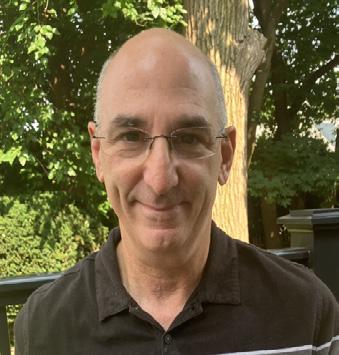
WELCOME to a Listening Circle, a type of circle where the goal is not to solve a problem or to repair harm or simply to get to know each other, but as the title says, to listen to each other. It does what all circles are meant to do: to give participants a chance to both listen deeply and share meaningfully. Circle seating reinforces the equal standing of all participants, and a talking piece that moves around the circle ensures that all people have a chance to share their thoughts while those without it are silent.
Today’s listening circle is among the toughest to imagine, but still I want you to imagine it. Its topic is the world outside that afects so many of us here inside at South and requires more trust and patience than we appear able to aford to give. Many students and staf members and their families are watching the news of war in the Middle East, tormented by its unrelenting tensions and pain; at the same time, they are following a presidential election that arouses fears of further civil discord. A space for people to share their distinct lenses through which they view these profound and historic moments can have the efect not of solving the problems outside but of encouraging the empathy that allows us to sit peacefully beside each other. Imagine that.
OPENING QUOTATION. “Our differences are our strength as a species and as a world community”—Nelson Mandela.
GROUND RULES. Imagine the talking piece, a river stone that says “Courage” on it and reminds each participant who holds it that leaning in to honesty among a diverse group of people, some of whom do not share their perspective, is hard to do and can require courage and trust.
CHECK-IN. Let people share how they’re feeling at the moment, given the impending uncertainty of even more violence abroad in the Middle East and of our tense presidential race. One word that crystalizes how they’re feeling will show the common expressions of worry, despair and anger that may oddly unite those with discordant viewpoints.
ROUNDS. Te go-around prompts can look the same in any listening circle: One— How have the recent events impacted you or your family and friends? Two—What do you need from others to feel supported and what can you do to support your community? And three—What gives you hope? Tis is where the people who agree to share openly and listen respectfully open themselves to seeing that they may share much in common with those with deep philosophical or personal diferences, where they hear the common language of both heartfelt pain and hope that can have the power to bind them in community rather than fracture them.
CHECK-OUT. Let’s go with something light: Starbucks or Dunkin’? Happiest comfort food? Favorite Pixar movie? Something that works to draw people together in the mildest way.
CLOSING QUOTATION. From Mother Teresa:“If we have no peace, it is because we have forgotten that we belong to each other.” I’m yearning for spaces in which those with Israeli family members and those with Palestinian family members can share freely and listen peacefully. Te courage and trust required for this level of openness is more than most can handle. And yet I want us to be optimistic for our future: we have no choice.

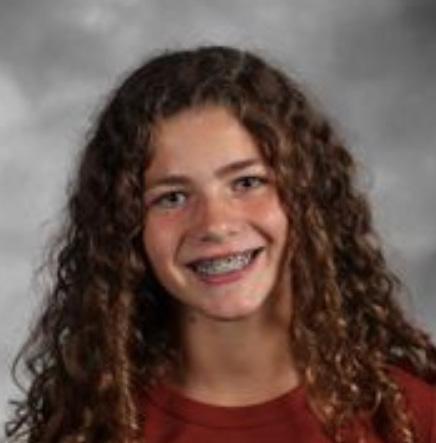
“My campaign strategy was mostly through social media. I also walked around and talked to people, and this helped me get to know people better and just made me seem more friendly"

“It matters to me a lot because I care about the community here at South and feel like I can do a lot with the capabilities I have and I also truly have an interest in policy at South”

“I really want to add more chairs and tables to the lobby because there really aren’t that many, and it makes a lot of people sit on the foor and causes a lot of inconvenience-I hope to fx that”

“I truly believe that the school environment should be able to provide students with a place so they can grow and thrive as a person”
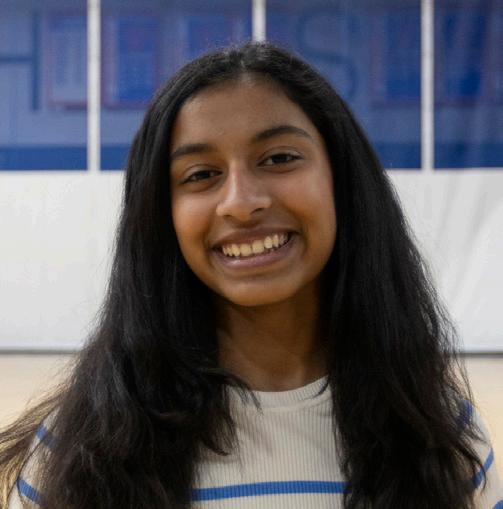
“I'm very enthusiastic, I believe in the things I do and I will implement the beliefs I stand for- I will not be a hypocrite. I'll honestly listen to people, and I’d love to fundraise for things we need”
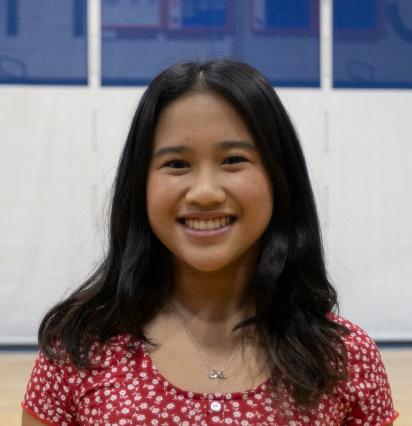
“Of our school values, I would like to emphasize taking responsibility”

“I will make sure to listen to [everyone’s] input and put more chairs in the cafeteria”
Sarah Schwartz Sports Editor
While the rest of the world was shut down in a global pandemic, junior Julia Conroy was baking up a storm in her kitchen.
What stemmed from a love of baking that she shared with her grandmother, was a kitchen counter covered in an array of sweets.
Te pandemic illuminated food insecurity in Newton and Conroy went to work fguring out what to do with her surplus of pies, cakes and cookies.
Conroy said that the idea of starting Give A Cake Bakery came to fruition during a long car ride back from Rhode Island.
“I was like, ‘Listen, I want to either sell what I bake or do something with what I bake,’” she said. “Tat hour-long car ride, I was researching Massachusetts food laws and fguring out how we could do something good
with what we were baking in the house.”
Give A Cake Bakery is a non-proft organization, now a two year registered 501(c)(3), that started out with the purpose of engaging with the community to provide baked goods for people in the Newton and Boston area.
Te organization does this work through donating pies to the Somerville Homeless Coalition for Tanksgiving, selling goods at the Newton Turkey Trot to raise money to donate to the Somerville Homeless Coalition, baking birthday cakes for kids in homeless shelters and donating baked goods to the Newton Food Pantry.
Junior Jane Tremaglio, who has been by Conroy’s side since the beginning, said it’s important to provide goods that aren’t considered essential.
“When people think of helping those in need, they think of providing the bare minimum, or providing things that are needs, but
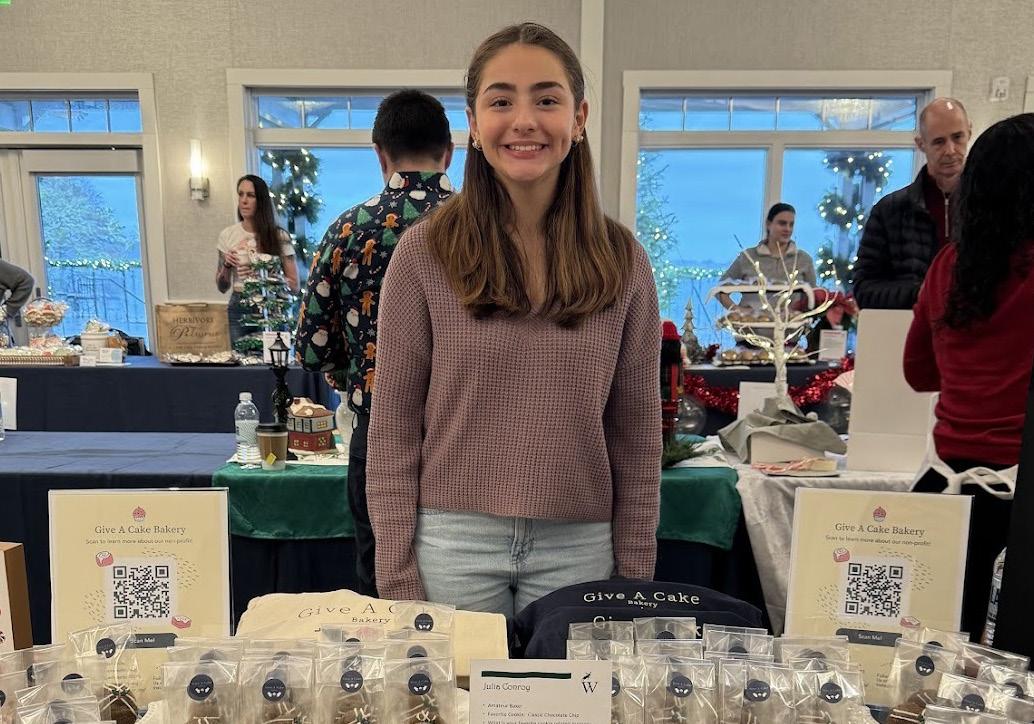
it's also important that they're getting things that are wants and little gifts, because everyone needs a little magic in their life,” she said.
Give A Cake Bakery ofers volunteer opportunities beyond baking, which junior Libby McKeigue who has grown up with Conroy, said she appreciates about the organization.
“I like that it has something for everyone. Even if you don't want to bake or do stuff like that, there are still ways to help out and that's really cool,” she said.
While much of Give A Cake Bakery’s early mission involved being in the kitchen and baking, Conroy said that she learned a lot about the ins and outs of running an organization and strives to share her fndings with others.
A Cake Bakery’s purpose and impact makes it an organization she wants to be a part of.
“Te most meaningful part has to be the reason behind what she does specifcally. Some people just try to look cool, but [Julia] is really here just for the cause,” she said.


“Te whole experience in terms of my education has been really valuable,” she said. “I'm really excited to be able to ofer that same kind of educational experience to other students about business through the lens of Give A Cake.”
In the spring of 2023 the organization hired student interns, some of whom have stayed involved with the organization, and ran an internship program with Harvard health lab accelerator. Give A Cake Bakery has connected with Match Charter public high school in Boston, where students like junior Asi Diallo have been able be ambassadors for the organization. Diallo said that Conroy’s passion for Give
Julia’s dad has watched her grow with the organization throughout the whole journey and he said her supportive leadership has cultivated Give A Cake Bakery’s lasting impact and uplifting community.
“[I’ve watched] her lead by example, but also in a real supportive way, leveraging the strengths that people naturally have, and things that people are naturally good at,” he said. “I think Jules is really good at building those things up in people.”
David Goose, a special education teacher at South and Conroy’s basketball coach said that Conroy has gone above and beyond for the organization.
“She's super caring when she's talking about the clientele or the people that are working for her,” he said. “She’s concerned about where this is going to go when she goes to college, when she can't be here. She really wants to put it in other people's hands to continue this.”
Give A Cake works with Hospitality Homes, an organization that works to fnd affordable housing for people that come to Boston to receive medical care, and Conroy said that she got to see the direct impact her work had for a young girl with a rare medical condition, who was there to get her 32nd surgery in 12 years.
“Being able to see how excited they were, and [how] her whole family was so into it, that was the ultimate feeling that I will remember forever,” she said.
By Ronen Heimlich
Although soccer is the most popular and well-funded sport in the world, circumstances such as socioeconomic status and a lack of neighborhood resources can often compromise the development of many soccer players.
Here in Newton, a group of South students aim to tackle this problem. Te Freekick Initiative, founded by seniors Michael Shen and Ben Briansky, is a non-proft soccer clinic with the mission of providing completely free, organized soccer clinics for kids in grades three through seven.
For Shen, varsity goalie for South’s soccer team, the idea of Freeick began in August of 2023 as he scrolled Instagram reels he said.
“I saw this page, where in New York City, there were these high schoolers that were going to parks and putting up basketball nets at parks that didn't have nets,” he said. “I was like, ‘that's a cool idea. What if I could do that for soccer?’”
Shen quickly got teammate Ben Briansky in on the initiative. Despite the motivated start, Shen said that the Freekick Initiative faced roadblocks from the beginning.
“We put up a soccer net at Highlands Park, but it got taken down like two days later,” he said.
Te project was shelved, until an endof-year civics project motivated the team to revisit the initiative last May. Tis project also introduced director and senior Ernest Lam to Freekick, who immediately joined Briansky and Shen in bringing the initiative to life.
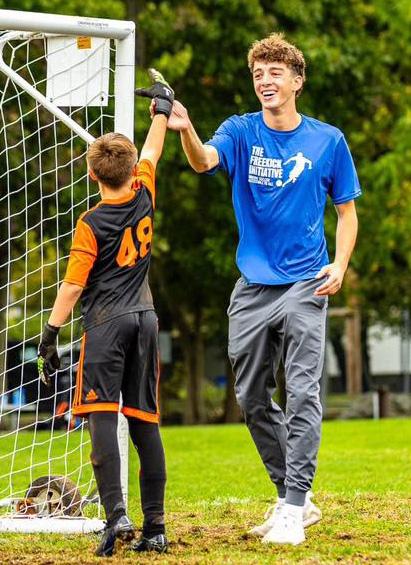
Briansky recalls the decision to revamp the project;“Michael came out, and he was like, ‘okay, like we're gonna start actually doing this.’ So then we made our group chat.”
Tis newly-energized team added more South soccer players to the staf, and pivoted from replacing nets to planning out youth soccer clinics.
Briansky said the process wasn’t straightforward, despite the energy of the staf.
“We kind of slowly, methodically started planning and then it kind of came together,” he said.
Along with planning the clinics, Shen and Briansky underwent the challenging legal process in order to legitimize Freekick and create a professional brand image.
“I think my biggest challenge was logistics,” he said. “Just keeping track of emailing all the people who were helping us for the tournament, the shirts, the insurance and the permit.”
Te Freekick Initiative team hosted their frst clinic in mid-July, bringing together over 50 budding soccer players from the Newton area.
While coaching many energetic middle and elementary schoolers is a taxing efort, junior and varsity player Joelle Weldon said her time coaching was a fulflling experience all around.
“Tey get to do what they love, and I get to do what I love,” she said. “When all the kids leave, they leave happy.”
Lam said hearing the appreciation from
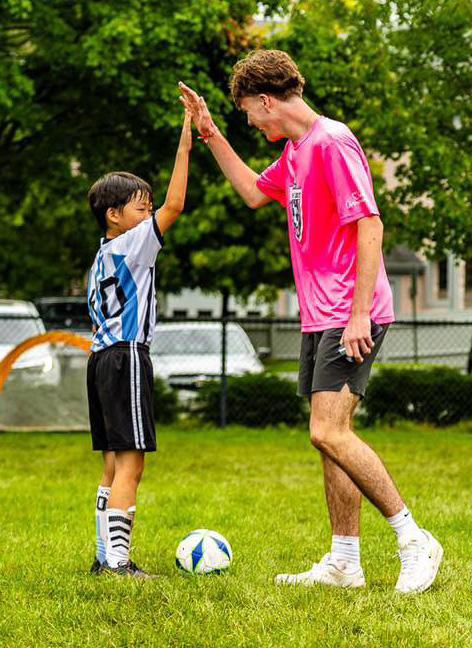
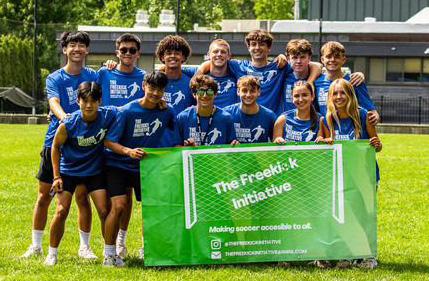
parents was always a mark of success.
“I deal with a lot of the parents, and I feel like it's really rewarding when I hear back from them and get to talk to them about the next clinic. It’s awesome seeing how appreciative they are,” he said.
Senior Meghan Holt said that a crucial factor to the success of the initiative was the interest from both boys and girls, even if coed playing is difcult.
Te most challenging thing as a girls coach is getting the girls and boys to play together,” she said.
Despite this, Holt said she pushes the girls to enjoy their time and improve their skills, no matter who they play with.
“Tere’s a girl who’s been playing with the boys, and she’s been dominating them. Some girls feel like they may not ft in, but the clinic defnitely improves their playing,” she said.
On Sep. 22, Freekick hosted an amateur three-on-three tournament for high school students, designed to raise money to fund future clinics.
Senior and tournament champion Alex Rhein said the event culminated in an electric atmosphere, with athletes and amateurs alike enjoying intense competition.
“Te crowd was super hype, and the games got pretty competitive at the end. A bunch of people even stuck around after their team lost to watch the championship game,” he said.
Shen said the amateur tournament was a success, and showed the endless possibilities
for future innovation for an already promising initiative, such as expanding to older age groups.
“Overall, it was a huge success for us. To see all our friends come out and support us was really meaningful, and the soccer itself was super competitive and fun to watch,” he said.
Riding the momentum of a successful summer into the fall, Lam said the team is already hard at work fnding new ways to reach the growing number of interested kids in Newton and beyond.
“We’ve also started expanding into Brookline,” he said.“[Te Brookline high school soccer team] will start running clinics in the spring, around the same time.”
While the clinics have had a profound efect on the youthful athletes who simply enjoy the game of soccer, senior and Freekick coach Lucas Nelson said the coaches have taken appreciation from the bonding as well.
“It's a good way to bring the soccer community together outside of older coaches and structured teams, with the varsity high school athletes coaching the kids in town,” he said. “It's a diferent experience for the kids, and for us as coaches.”
Lam said that the initiative has been meaningful, and the impact of their work goes past just the sport itself.
"Seeing the kids come back to every clinic, smiling and getting better each time, reminds us why we started this. It’s more than just soccer — it’s about building something meaningful for the community, and that’s what keeps us going,” he said.
Mitchell Lookner & Owen Halberstadt Sports Reporters
“Just have fun!”
“Try your best out there.”
Easier said than done with parents screaming their lungs out at their elementary school-aged children, all because they missed a free throw in a low-stakes basketball game. What about car rides home after a bad game where your dad is ranting at everything he thought you did wrong?
While many parents play a supporting role in their child’s endeavors in sports, some go overboard and get too into the game, resulting in a situation where neither they nor their child are having fun.
A referee’s job is to pay attention to the game and make correct calls based on what they see. Unfortunately, referees are human, and therefore, not perfect; however, this does not stop overly competitive and rowdy parents from shouting jeers at the referees for making one bad call.
Oftentimes, parents forget that their precious little darling is, in fact, not a professional athlete getting paid millions of dollars a year, and start rooting for their kids’ team like their life savings are on the line.
Driving this unnecessary passion and emotion in the game are parents believing their kids to be the next Michael Jordan. Tat blind belief is sweet, but in reality, only 2.3 percent of high school athletes go on to play professional sports.
Furthermore, this fxed mindset results
in parents overreacting to a subpar performance by their child, which only puts more pressure on them and can worsen their gameplay.
While most parents sit back and let the coach do their job, other parents try to act as the coach while sitting in the stands. Parents having a good relationship with their child’s coach is essential for kids, as they act as a role model and can make a huge impact on their life.
Frequently, over-supportive parents will brainwash their child into thinking that they are much more talented compared to others, which brings out a sense of superiority and arrogance that displays itself not only in their games and practices but in their daily lives.
Tis immaturity in sports comes in the forms of taunting and fooling around, and it is these kids who lack the necessary focus and sportsmanship that make sports so popular and important in the frst place.
When a child watches their parents argue with a referee or coach, it signals to them that this behavior is acceptable, propelling them to do the same as their parents.
Tis endless circle is a leading problem in the world of youth sports; the utter immaturity, cockiness and selfshness brings drama into every game.
Parents face a common challenge in fnding a balance between pushing their kids to be their best selves while at the same time helping them grow instead of putting them down.
In 2023, 53.8 percent of kids between the ages of six and 17 in the US played on a sports team or took sports lessons, a number that has fuctuated between 53-58 percent in the past seven years. With a majority of kids
participating in sports, especially at such a developmentally crucial age, parents must play a positive role in their children’s development by educating and motivating, not screaming and crushing their dreams.
Tere is a fne line between encouraging your kids to be the best that they can be, and interfering with their sport to the point where they lose their love for the game.
Some parents do not understand the difference between constructive criticism, which builds players up and makes them better, and destructive criticism, which breaks them down.
Obviously, many parents don’t ft this model. A large majority of parents are the people who get their kids hooked on a game, drive them to those 8am practices, pay for their insanely
expensive sporting equipment and are at every game cheering for them — just not screaming at them. Tese are the parents who encourage their children to be their absolute best, while also letting the coach do their job, ultimately leading to their kid developing a deeper love for the sport. ‘
When parents show their kids what it takes to be talented and successful as an athlete, kids will follow the necessary steps in order to reach that goal: working hard every day, staying consistent and dedicated, and learning from their mistakes. All of these values can be applied to everyday life, proving that the bumpy journey of becoming a successful athlete improves the natural habits of kids, better preparing them for the future.

Joey Giragos & Sarah Schwartz Sports Editors
Open the doors to Gym B after school, and you might be walking into the most joyful basketball practice of your life — spontaneous dance parties, cheering during back and forth scrimmages, a laughter-flled gym and shoot-arounds that double as updates about each other’s days.
Allowing kids both with and without disabilities to bond over sports, Unifed basketball might be the most inclusive, open, and captivating sport at South. Unifed’s accepting nature fosters an environment built solely on fun, improvement, and community.
Unifed basketball ofers an inclusive space for students of all physical and intellectual abilities to come together and play basketball with their classmates.
Te team consists of partners who assist and play with the athletes, guiding the athletes through drills at practice, playing games of ‘fshy-fshy cross my ocean’ together at practice and working together during games to give everyone their best shot.
Te team’s camaraderie and the bonds they’ve been able to build makes the environment so much fun for athletes like sophomore Ethan Procaccia. He said that meeting a wide variety of players makes the team special.
“My favorite part about being a part of unifed basketball is getting to partner up with people that are more fexible,” he said.
Coach and behavioral therapist Jesus Rodriguez said the relationships between partners and athletes are the most special element of Unifed Basketball, as the team extends beyond the lines of the basketball court.
"For me, it's about more than just the
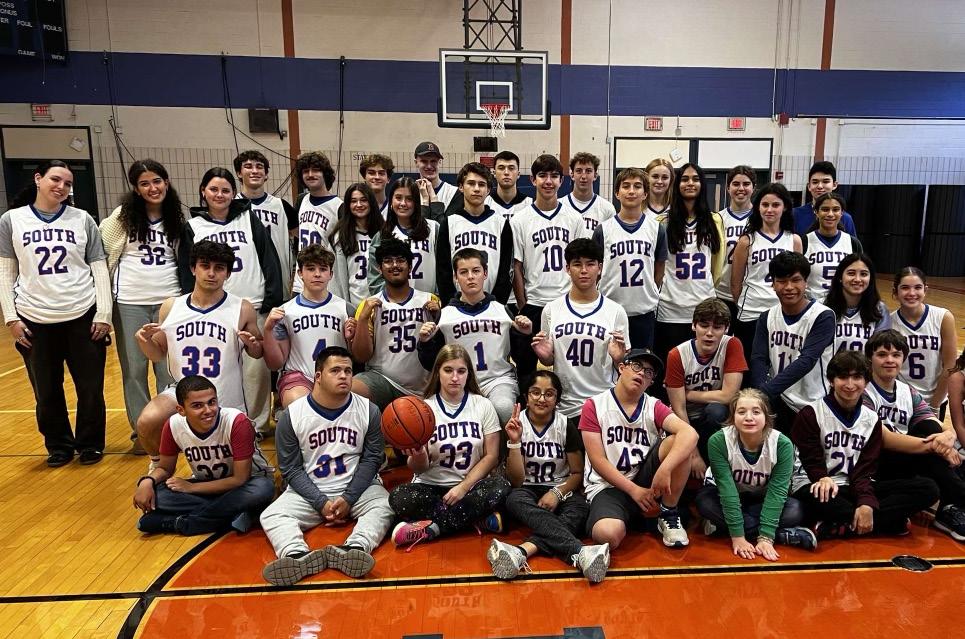
sport. It's about building a community, seeing students talking and connecting in the hallways, making friends,” he said. “It's important for them to be a part of something bigger than just the game."
Te nature of the team, which doesn't require any tryouts, contributes to this inclusive, accepting culture.
Sophomore athlete Pranav Raman said he was full of gratitude when discussing the team and their contributions to his development as an athlete.
“I get to help lead the team and try my best. Te rest of the team, the coaches, the fans, the personnel are all brilliant. I couldn't thank them more for becoming the player I am today,” he said.
Unifed ofers a unique opportunity for everyone involved to experience the community of being on a team, and sophomore athlete Shivani Jagannath enjoys getting to try a new sport.
“[My favorite thing is] meeting new people and improving my basketball skills and playing in games,” he said. “I also joined it to get more active and exercise. And I think [basketball] is a fun sport.”
Te spirit of the team shines through: the games are the culmination of the excitement the team shares. Te connectivity of the team is present in the tunnels the partners create for the athletes to run through when they’re introduced, and the group circles around for inspiring pregame speeches.
Senior captain Vivi Shreve says the joy of the games is contagious which cultivates an atmosphere of an indescribable feeling.
“In the games, we all get so excited, and the energy in the room is just so awesome, like you can never get bored of it,” she said. “It’s just an awesome feeling, and seeing that is something
You shouldn’t judge people based on their ability, you should always see that the disability can be an awesome ability
Bella Champion class of '27
super special.”
Rodriguez said that Unifed’s core values are on display in games and that Unifed’s impact spreads far beyond just the fnal score.
"Te games are always full of energy, and it’s competitive, but there’s something special about the way it brings everyone together,” he said. “It’s not just about winning—it's about inclusion and teamwork."
During a game last year against Newton North, a North player hit a half-court buzzer beating shot. Players from both teams went ecstatic and senior captain Teddy Shifman said the moment encapsulates what Unifed is all about.
"Tat’s kind of the beauty of Unifed. Everyone is cheering for everyone the entire time. It's not as much about winning as it is about helping people achieve and having fun," he said Sophomore Bella Champion dominates game in and game out and helps lead and teach her fellow athletes to improve their basketball skills. She sees the great joy and efort of her friends and believes in them.
“Tey’re amazing. Even though they have disabilities, they are still amazing shooters. And you shouldn’t judge people based on their ability,” she said. “You should always see that the disability can be an awesome ability.”
By Ishan Jathar
Decorated Kansas City Chiefs kicker
Harrison Butker had just come of his third Super Bowl victory when he attended Benedictine College to deliver a commencement speech.
Tis, in itself, is typical; many athletes and celebrities are targeted by colleges to speak at graduation, as their success is often seen as a way to motivate the graduating class.
Butker, however, fipped the script. His contentious and targeted speech consisted of many critiques of modern society and controversial beliefs.
After listening to Butker’s address, many fans, players, and even the NFL took to social media to share their opinions.
While Butker’s comments may have been controversial, and even hurtful to some, we all have the right to state our opinions, and for professional athletes, it should be no di
An example of the power and prevalence of politics in sports comes from the Olym pics, one of the world’s premier and historical sporting events.
Te Olympics and politics have long gone hand in hand, dating back to the early 1900s, when politics began to be heavily integrated into the Olympic structure.
A prominent example of politics in the Olympics came during

the 1936 Berlin Summer Games, known as “Hitler’s Olympics.”
African-American track star Jesse Owens faced adversity due to the racist Nazi purist ideologies present in 1930s Germany, but Owens got the last laugh.
He ended up winning four gold medals and shocking the German people, who believed that they could not possibly lose to an individual they deemed inferior.
More recently, politics have continued to play a role in the Olympics, as demonstrated by the organization barring Russia from competing due to their invasion of Ukraine.
Athletes have long been given a platform that they can
By Tyler Germain
olitics and sports don't mix.Sports are a place to escape, where all can come together and enjoy a game without worrying about the problems and stress of the real world.
to real-world issues, the league has its own problems that it should prioritize.


to combat racial disparity. Years later in 2012, Ali received the Liberty Medal for his actions.
His work didn't interfere with his career, similar to how Butker stated that his political views wouldn’t afect his on-feld performance.
Pro athletes such as LeBron James, Christiano Ronaldo, and Shohei Ohtani wield massive infuence, and when athletes use their voices, the potential for change is signifcant.
Athletes are human too. Like any person working a normal job, athletes have the right to express their opinions, and competing at a high level is not the only piece of their character.
Of the feld, athletes can live normal lives and should be free to express opinions like everyone else.
Politics and sports have always been connected and will continue to be. No matter how much we try to separate them, the two will remain intertwined.
always be asking the same question: what does this have to do with sports?
On the fip side, political movements can also originate from sports and expand into the broader political atmosphere.
Te most well-known example of this is from 2016, when San Francisco 49ers Quarterback Colin Kaepernick famously refused to stand during the national anthem, sparking a movement that lasted from the preseason through the start of the regular season.
Many players around the National Football League (NFL) joined the movement, and it gained recognition from national news outlets, prompting discourse not just from sports fans but also from average Americans.
Kneeling during the national anthem became a major political issue, with President Donald Trump famously saying NFL owners should cut players who refuse to stand for the anthem, and it fueled the growing divide in our country.
Leagues bringing politics into their own atmospheres can feel misplaced, and there are other, more pressing things the leagues can be spending their resources on.
While the NFL holds participates in many promotions and demonstrations, such as My Cause My Cleats, Salute to Service, and Black Lives Matter, which bring attention
Te NFL’s primary responsibility is ensuring the league runs smoothly, not making political statements.
Despite many innovations in helmet technology, injuries still remain a major problem in the league today.
Players such as Tua Tagovailoa have suffered multiple concussions, and other stars, including Aaron Rodgers, Kyler Murray and Jordan Love, have all sufered long-term injuries on felds that weren’t properly maintained.
In a sharp contrast to the NFL, Major League Baseball (MLB) has paid much less attention to political issues in recent years and has focused on making game innovations.
Tese improvements included the pitch clock and the disengagement rule — both of which have contributed to a sharp increase in both viewership and revenue. Bringing politics into sports can divert attention away from the problems that matter most within the leagues, and it can anger fans as well as the general public.
Although there may be political opinions that players or leagues may feel the need to express, these opinions have nothing to do with sports and don’t belong on the feld.

Mitchell Lookner & Sarah Schwartz Sports Reporter & Sports Editor
With the lights shining brighter than ever on the Women’s National Basketball Association (WNBA) this season, fans across the country packed arenas like never before — and when this new audience sat down to watch in record numbers, it was the biggest stars in the WNBA who they watched shine the brightest.
Te game’s top talents led an intriguing race to the fnish, with a great parity of talent across the league. While teams like the Minnesota Lynx, Connecticut Sun and Las Vegas Aces put forth impressive records this season, one team was the clear favorite: the New York Liberty.
With two of the WNBA’s top 10 leading scorers at the head of the ship, slashing forward Breanna Stewart and sharp-shooting guard Sabrina Ionescu, the Liberty dominated.
A’ja Wilson. Wilson, Las Vegas Ace’s versatile big man, won her third Most Valuable Player (MVP) award in fve years this season, and her MVP campaign was one for the record books.
Becoming the frst player in WNBA history to score 1,000 points in a season, Wilson added to her legacy – which is already in the company of the league’s greats – and she’s just in her seventh season. Wilson carried much of the load for Las Vegas, as the defending back to back champs worked through a rough start
guard play of sharp-shooting Kayla McBride and shifty Courtney Williams which led to a well-rounded attack for head coach Cheryl Reeve, who also guided Team USA to a gold medal at the Olympics.
Te Sun earned the third seed as they relied on their‘engine’: the triple-double averaging Alyssa Tomas. Alongside her fancé and midrange merchant DeWanna Bonner and Connecticut’s gritty defensive guard DiJonai Carrington, Tomas orchestrated the Sun’s
a record of 20-20 that secured a playof spot for the group.
Angel Reese has often shared the spotlight with Clark both in college and the pros; however, the national champion has made a name for herself on the Chicago Sky, averaging a double double with 13 points and 13 rebounds. Reese broke the record for the most consecutive double doubles in history with 15 as she grabbed the second most rebounds in a single season with 446.

Stewart, who has won two WNBA championships and Finals MVPs with the Seattle Storm, is hoping to use her championship pedigree to avenge the Liberty’s failed trip to the Finals the prior season. With the play of Ionescu and versatile center Jonquel Jones, Stewart helped lead the Liberty to a record of 32 wins and eight losses.
Speaking of big stars and big names, the biggest would be WNBA’s leading scorer
and fnished as the fourth seed with 27 wins and 13 losses.
A fght to catch the Liberty ensued as the Minnesota Lynx and Connecticut Sun battled it out for the number two seed all season long. Forward Napheesa Collier, who came in second in MVP votes and who was this season’s Defensive Player of the Year, led the way for the Lynx averaging 20 points and 10 rebounds. Her dominance in the paint, seemingly efortless around the rim, complemented the elite
eighth consecutive trip to the playofs, the longest active streak in the WNBA.
Up-and-coming stars also got a chance to prove themselves on the court. After one of the most decorated collegiate careers in women’s college basketball history at the University of Iowa, Clark was immediately tasked with leading a young Indiana Fever team.
While Clark and the Fever got of to a rough 2-9 start, they bounced back, winning 18 of their next 29 games and fnishing with
Basketball fans across the world tuned into these high intensity games between Reese and Clark, as two of the four games were decided by just one point.
In their second matchup on June 16th, the game had a record-setting average viewership of 2.252 million people, the most in any WNBA game in 22 years.
Te exciting storylines and high-level basketball were the reason for the league’s 48 percent pjincrease in fan attendance from last season, along with over 54 million viewers across all platforms, a new record for the WNBA.
Additionally, WNBA merchandise sales went up a whopping 601 percent from last season, as fans all over the country can be seen rocking their favorite player’s jersey.
Tis popularity for women’s basketball not only generates more revenue for the league and for the players, but also helps to spread the word about the excitement of women’s sports as a whole.
Te White Mountains are timeless in their beauty, easily accessible to hikers of all experience levels from the Greater Boston area.
Imagine this: you’re high up in the White Mountains, in northern New Hampshire, as the wind begins to howl and dark clouds roll in. \You’re above the treeline, completely exposed, as the temperature drops, and the sun sinks behind the peaks before you. Te trail up ahead is barely visible through the whirling snow that now flls your feld of
However, as shockingly gorgeous as these ancient peaks are, they can be just as shockingly unforgiving if you’re not properly prepared.
Before you set out, it’s essential to respect the wilderness and understand your own limits.
Tese mountains ofer incredible experiences, but only if you’re ready to take them on. Here’s a complete guide to a safe and rewarding hike.
Te weather in the White Mountains is notoriously unpredictable: conditions can change rapidly, especially at higher elevations where the temperature can dip below freezing, even in the summer.
Always pack extra layers, even on warm days. Insulating clothing, a hat, gloves and waterproof gear can be lifesavers when the temperature drops or if rain/snow moves in.
As vital as proper clothing, proper navigation is critical for safely hiking anywhere. Make sure you have a GPS map, which can be downloaded through apps like AllTrails
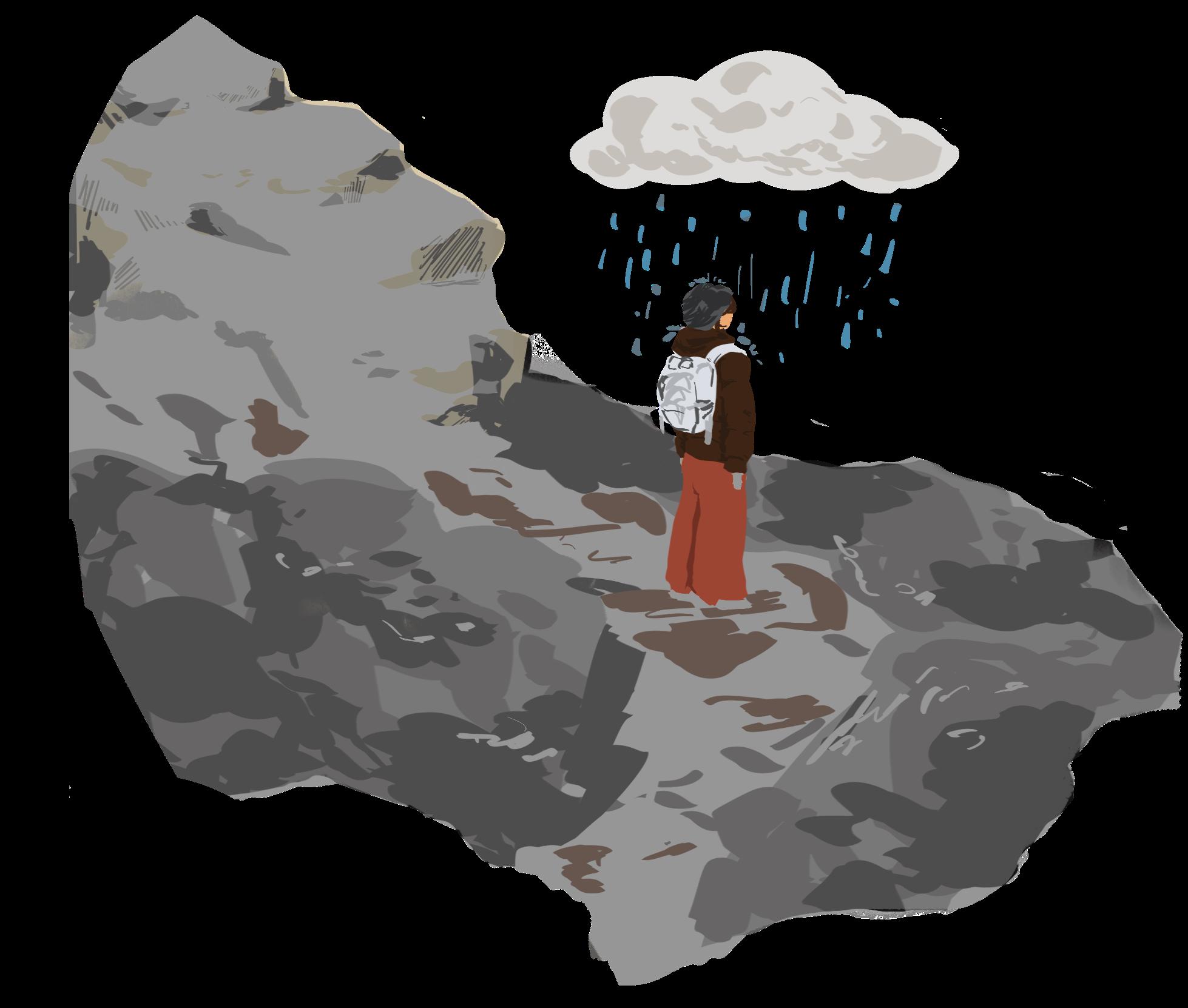
Don’t forget a headlamp in case the hike takes longer than expected; navigating trails in the dark without light is a recipe
2) Find a hiking buddy.
Solo hiking can be peaceful, but when tackling more remote or strenuous trails in the Whites, it’s safer to hike with a friend.
Having someone to lean on in tricky situations or simply to share the experience with is invaluable. A friend can help carry important gear, boost morale, and even assist in an emergency.
Plus, if you happen to encounter wildlife, there is safety in numbers.
3) Check the weather
Checking the weather forecast before setting out is crucial.
Storms in the mountains erce, with rain, wind and low visibility creating hazardous conditions, especially above the treeline. Don’t just rely on forecasts from
the peace, fresh air and the achievement that comes with reaching a summit of a hike.
the towns below; research mountain-specifc weather reports to get a sense of conditions at diferent elevations. If bad weather is predicted, it’s better to postpone your hike than to risk getting caught in a storm.
4) Know your limits.
Te White Mountains ofer a wide range of trails, from well-traveled, family-friendly paths to intense and rugged multi-day routes. It’s important to know your physical limits and to choose a trail that matches your ftness level and experience.
If you’re new to hiking, start with shorter, well-marked trails and work your way up. Tere’s no shame in turning back if a trail becomes too tough, it's always better to retreat safely than to push on dangerously.
5) Enjoy the outdoors!
While preparation is critical, don’t forget to soak in the beauty around you. Te Whites are stunning, with dramatic landscapes that are hard to match.
Enjoy the peace, fresh air and the achievement that comes with reaching a summit or completing a hike.
Hiking is a fantastic way to connect with nature and should be enjoyed. With these tips, hiking in the White Mountains can be an unforgettable and safe adventure — so pack smart, check the weather, know your limits and get ready to enjoy the timeless wilderness.






1) Nickname for 100-500 word torture devices required for college applications
3) Oct 26-27, according to spooky season partiers
4) Birds, bees, butterfies; subject of Newton Conservators’ recent garden tour
6) Lasagna-loving cartoon cat; Andrew of “We Live in a Time”
7) Initiative created by South seniors to increase soccer accessibility
8) Field in which Newton Centre resident Gary Ruvkun won this prize (see #10)
12) Phone pouch company contracted by NPS middle schools
Boo! Celebrate the spooky season with some hocus pocus puzzles



Supps, White,
2) You can fnd a guide to hiking these mountains in this issue
4) Presidential election Keystone State, NSPA destination, cheesesteak locale
5) Maya who plays Kamala Harris on SNL; one of Santa’s reindeer
7) Number of librarians and library aides
9) Non-proft bakery that donates sweet treats to those in need
10) Prize named after the inventor of dynamite with six felds; most notably, peace.
The World According to
Matteo Lee
Humor Columnist



Who was the Most Powerful Sith?


As humans, we face questions every day. Some questions are asked more often than others, like “what’s your name?” or “how are you?” However, there is no question that I face more on a daily basis than “who was the most powerful Star Wars Sith?”
If you don’t know what a Sith is, to put it into extremely simple terms: (the Sith are not simple people) they are the “bad guys” in Star Wars who have red lightsabers. If you don’t know what Star Wars is, you need to reconsider your purpose on this earth.
Te Siths I will be comparing today are Darth Maul, General Grievous, Kylo Ren and Darth Vader. Unfortunately, Darth Plagueis the Wise did not make the cut because I will only be talking about Siths before the year 147 BBY.
Te frst attribute that I will compare the Siths upon is force ability. We’re going to have to remove General Grievous from this list because he cannot use the force. Tis is mainly a result of the fact that Grievous is not a trained Sith and actually a cyberoge.


11) Editor-in-chief, music afcionado, “she is beauty, she is _____, she is Ms United States”
13) South alum, anti-vax podcaster, WWE star
14) Field in which Newton Centre resident Daron Acemoglu won this prize (see #10)
Happy Halloween from The Lion's Roar!
Aquarius (Jan. 20-Feb. 18):
Dive into your quirk as Conspiracy Teorist, wearing a tinfoil hat and ranting about how candy is part of a secret alien agenda. Fear: Being normal—if someone calls you ordinary, it’s over.
Pisces (Feb. 19-March 20):
Party in pajamas as Person Who Just Got Out of Bed, perfect for those embracing life’s permanent snooze button. Fear: Responsibility—you’d rather daydream than adult for a day.
https://crosswordlabs com/view/2024-10-19-330
Aries (March 21-April 19):
Be the hero you think everyone needs as a Superhero Whose Origin Story We’ve Heard 100 Times, dramatic fair included. Fear: Being forgotten—if no one’s watching, what’s the point?
Kylo Ren is going to have to go next because his rival Jedi (Rey) isn’t quite as strong as some of the other Sith opps. Darth Maul had to square of with young Obi-Wan Kenobi and Qui-Gon Jinn, and Darth Vader had to tussle with prime Luke Skywalker (He is one of my idols along with Gandhi and Jesus).
Tis leaves me with Darth Vader and Darth Maul, which is an extremely tough decision. Tis is like choosing between (Fill in with 2 hard things to choose between) or “Empire Strikes back” and“a new hope”. I think I’m going to have to stick with Darth Vader.
Tough they were evil deeds, what he accomplished in the Star Wars Galaxy in terms of overall galactic impact is incomprehensible. An evil, but complicated man, formerly known as Anakin Skywalker, Darth Vader is the most powerful Sith in Star Wars history.
Taurus (April 20-May 20):
Wrap yourself in luxury and warmth by going as a Cozy Blanket Burrito, because you refuse to be cold at the party. Fear: Change—even switching cereal brands is a crisis.
Gemini (May 21- June 20): Can’t decide? Be both in one with Half Business, Half Party, and keep everyone guessing which version of you they’ll meet. Fear: Making a decision—chocolate or vanilla? Te struggle is real.
Cancer (June 21- July 22): Go as A Box of Tissues, perfect for comforting others and crying over how cute everyone’s costumes are. Fear: Someone being upset with you—you’ll lose sleep over it for weeks.


Leo (July 23- Aug. 22):
Shine as Instagram Infuencer in the Wild, complete with your own portable ring light and endless photo ops. Fear: No likes on your selfe—if it’s not Insta-worthy, what’s the point?
Virgo (Aug. 23- Sept. 22):
Organize everyone’s life as Marie Kondo, folding costumes and sparking joy one neatly carved pumpkin at a time. Fear: Imperfection—a crooked frame or typo could destroy your day.
Libra (Sept. 23- Oct. 22):
Balance indulgence and restraint as Scales of Justice, ofering both candy and kale while debating life’s choices. Fear: Confrontation—you’d rather eat the wrong order than complain.
Scorpio (Oct. 23- Nov. 21):
Channel your inner sleuth as a Private Investigator, asking invasive questions and acting like you already know everyone’s secrets. Fear: People knowing you care—feelings? Nope, never heard of them.
Sagittarius (Nov. 22- Dec. 21):
Go as Backpacking Tourist, loaded stories about your wildest adventures, mostly involving fnding the bathroom. Fear: Commitment—RSVPing to anything makes you break out in hives.
Capricorn (Dec. 22- Jan. 19):
Show the true horror of work-life with Corporate Zombie, complete with dead eyes and a stack of emails you’ll “circle back” to. Fear: Failure—not achieving your goals is your worst nightmare.